






INSIDE: Investment spend grows, Transforming education, Generational growth, An environmental crisis, shared value, FINANCE, Unpacking ESG








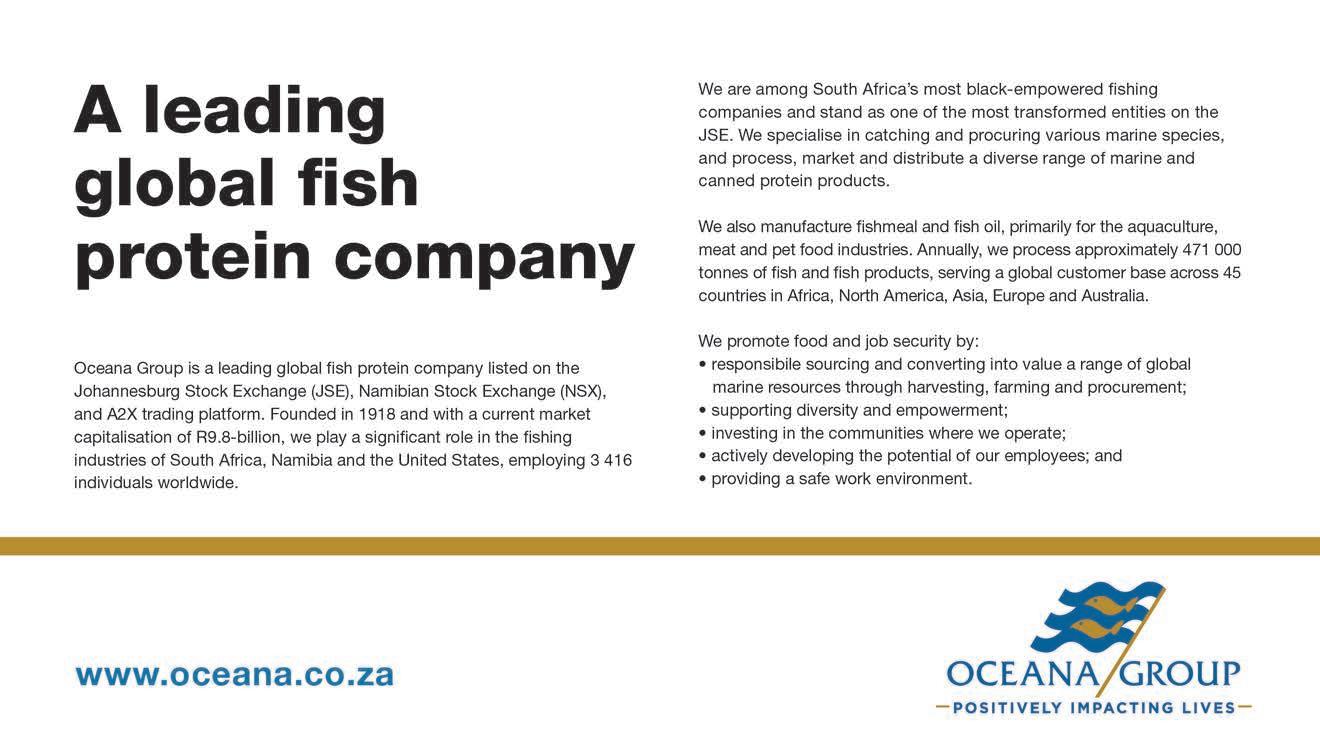

PUBLISHED BY Picasso Headline, A proud division of Arena Holdings (Pty) Ltd, Hill on Empire, 16 Empire Road (cnr Hillside Road), Parktown, Johannesburg, 2193 PO Box 12500, Mill Street, Cape Town, 8010 www.businessmediamags.co.za EDITORIAL Editor: Ryland Fisher Content Manager: Raina Julies rainaj@picasso.co.za Contributors: Lorelle Bell, Trevor Crighton, Cuma Dube, Cathy Duff, Robert Erasmus, Robyn Hills, Balan Moodley, Busani Moyo, Charmain Naidoo, Leona Pienaar, Dalit Shekel, Patric Solomons, Anelisa Tuswa, Reinoud Willemse, Deb Zelezniak Copy Editor: Anthony Sharpe Content Co-ordinator: Natasha Maneveldt Digital Editor: Stacey Visser
egular readers of this publication would have noticed that it is no longer called CSI, but rather Social Impact. The new name reflects the reality that, as businesses, nongovernmental organisations and individuals, we need to do more to root out social injustices and challenges. We need to do more to uplift society in a meaningful way, going beyond ticking the boxes in an attempt to improve our black economic empowerment rating and access government contracts.
We need to see the work that we do, whether it is through philanthropy or corporate social responsibility, as tackling the root causes of social ills such as poverty, inequality and unemployment, which of course lead to other social ills, such as crime and corruption. Moreover, now more than ever, we have to do everything in a sustainable manner.
In this issue of Social Impact we unpack the effect social investment has on long-term sustainability and development. We highlight how this type of investment supports meaningful corporate citizenship where what we do adds real value to the people and communities around us.
We hope you enjoy the read and that it will help you make more of a social impact, whether it is through your company or personally.
Ryland Fisher, Editor
6 CSI SPEND
Just where did South African companies spend their collective R11.8-billion corporate social investment budgets in 2023?
10 EDUCATION
Afrika Tikkun’s transformative impact on education; Building successful STEM careers; Molo Songololo – preparing the young.
14 EDUCATION SPEND
How two financial services organisations are leveraging their education spend to support sustainable whole-community development.
15 PROFILE: MES
Unpacking what it means to change the heart of the city.
18 PARTNERSHIPS
Strategic collaborations are among the best tools to help organisations achieve maximum impact.
19 PROFILE: SANTA SHOEBOX PROJECT
Why donors and volunteers are needed to bring joy to disadvantaged children.
21 GROWTH
The private sector is stepping in to provide sustainable solutions to South Africa’s socioeconomic challenges.
18

26 HEALTH INVESTMENT
Why health is an essential component of sustainable community development; Can South Africa afford the National Health Insurance scheme?
27 ENVIRONMENT
Climate change is a reality, so why are we ignoring it?
30 PROFILE: FOOD & TREES FOR AFRICA AND THE SAB FOUNDATION
Joining forces to make a positive environmental impact in the Eastern Cape; Profiling the SAB Foundation’s various empowerment programmes.
34 SHARED VALUE
How businesses are making sustainable and scalable social investments.
35 SOCIAL IMPACT
Why sustainability and impact management matter now more than ever.
38 ENVIRONMENTAL, SOCIAL AND GOVERNANCE
As ESG goes mainstream, the public, regulators, investors and funders are starting to notice; ESG principles are becoming more important for businesses, and for good reason.
40 INVESTMENT
The paradox of private investment in Africa highlights the need to move beyond a purely profit-driven approach; Nurturing nations for sustainable growth.
43 FINANCE
The evolving role of impact management and intermediaries.
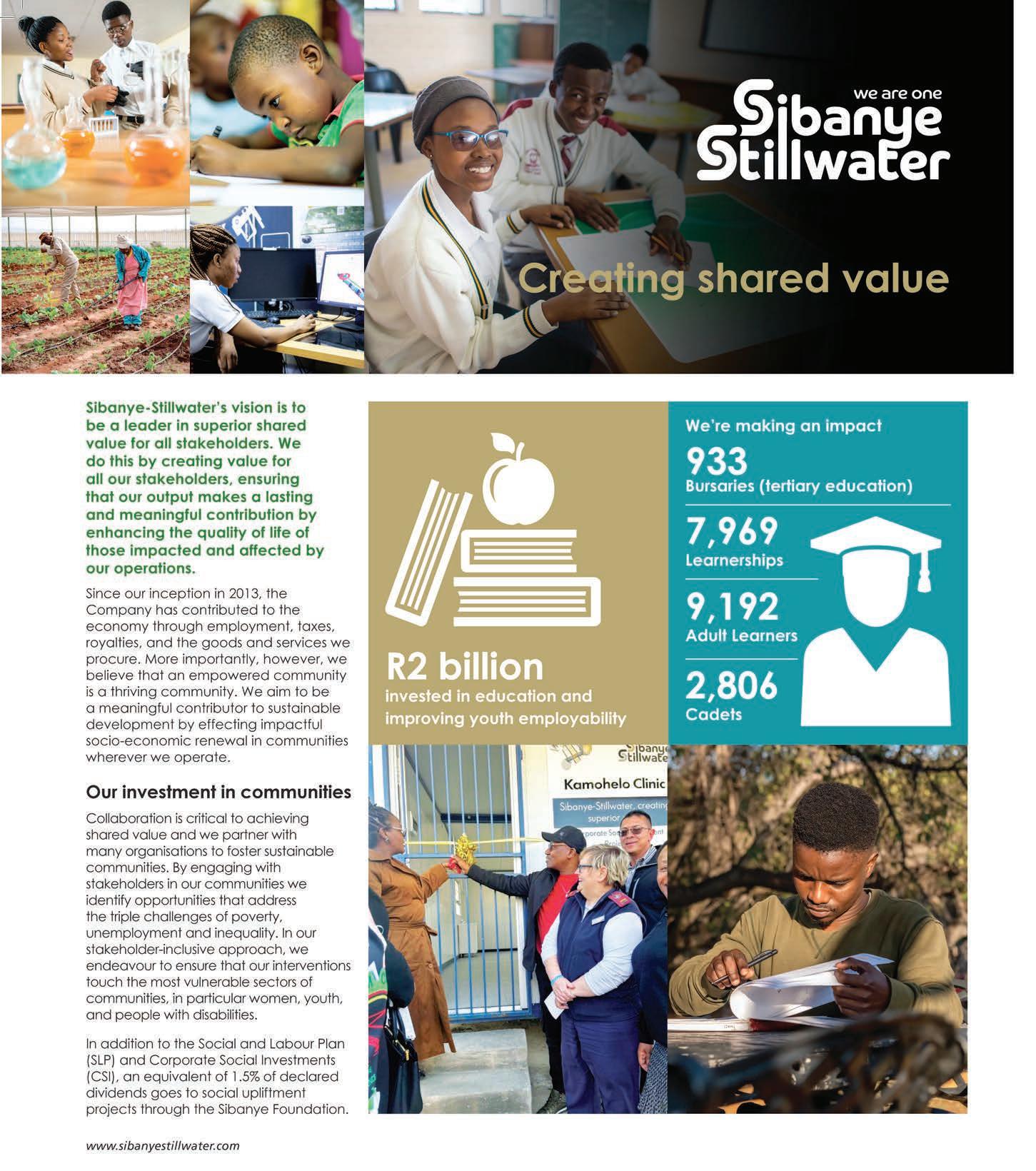

social issues and contributing to addressing the country’s social development challenges in the face of government budget cuts.
Education remains a priority CSI focus Development sector priorities were similar to previous years, with three sectors – education, social and community development, and food security and agriculture – capturing the bulk of CSI expenditure.
Education remains the most popular cause for local companies. Although 2023 figures showed a decline in company support for education, from 98 per cent of companies in 2022 to 78 per cent this year, the average spend increased from 44 per cent of CSI in 2022 to 48 per cent in 2023. Almost three-quarters of companies (74 per cent) support social and community development, unchanged from last year, spending an average of 13 per cent of CSI in this area. Food security and agriculture, which saw significant increases in support during the pandemic, was supported by 60 per cent of companies in 2023 and received an average of 9 per cent of CSI expenditure.
Education remains the most popular cause for local companies.

The 2023 R11.8-billion corporate social investment (CSI) spend reflects an 8 per cent nominal and 1 per cent real increase from R10.9-billion in 2022, on the back of post-COVID-19 recovery, low economic growth and a challenging operating environment. These findings, published in the latest annual edition of the Trialogue Business in Society Handbook, reflect a continued recovery in CSI expenditure, with more than half of surveyed companies (59 per cent) reporting an increase in spend, compared to 36 per cent in 2021.

About 60 per cent determined their CSI budget as a percentage of net profit after tax, supporting changes in corporate profits as the primary reason for increases and decreases in CSI.
South African companies, primarily driven by a moral imperative to influence positive social change, are increasingly positioning themselves to make a systemic impact. Their CSI efforts are becoming more collaborative, with resources being applied to research, networking and thought leadership in their development fields of interest. This is securing their voice on critical
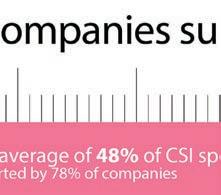

In contrast to trends in the United States, where health and social services receive 25 per cent of CSI spend on average, South African companies allocate an average of only 6 per cent to health. Even fewer companies
Companies and NPOs are more likely to integrate the sustainable development goals into their strategies than the goals of the South African National Development Plan.

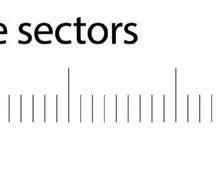



Food security and agriculture saw significant increases in support during the pandemic. These areas were supported by 60 per cent of companies in 2023 and received an average of 9 per cent of CSI expenditure.
supported the sector this year, dropping from 43 per cent in 2022 to 38 per cent this year.
More than a third of South African companies (37 per cent) claim to support environmental causes through their CSI, but this sector received just 3 per cent of CSI spend on average. More companies supported the sports development, social justice and advocacy, and safety and security sectors in 2023, though the average CSI spend for each remains below 5 per cent.
Nonprofit organisations (NPOs) remained the primary recipient of South African CSI, with 84 per cent of companies directing an average of 63 per cent of their spend to this sector in 2023. Surprisingly, the proportion of companies directing CSI funding to NPOs fell below 90 per cent, even as the average contribution increased.
After NPOs, schools, universities, hospitals and other government institutions were the second-most common funding channel, with 57 per cent of corporates providing an average of 19 per cent of expenditure towards them. Support of social enterprises increased from 17 per cent of companies in 2022 to 28 per cent in 2023, with social enterprises receiving an average of 5 per cent of CSI expenditure.

Most companies were reluctant to engage in more progressive types of funding, with more than 69 per cent indicating they would not provide funding for reserves, unrestricted funding or loans. However, 60 per cent of NPOs reported receiving unrestricted funding from companies, while 39 per cent received funding for reserves.
Fifty-three per cent of companies reported non-cash giving in the form of products or services or volunteering time, while 83 per cent of NPOs received non-cash donations.
Companies and NPOs are more likely to integrate the Sustainable Development Goals (SDGs) into their strategies than the goals of the South African National Development Plan (NDP), with 63 per cent of companies reporting integration with the SDGs, compared to 49 per cent for the NDP goals.
Companies aligned with 5.6 SDGs on average. CSI programmes aligned most closely to SDG 4 (quality education), with 84 per cent of companies reporting alignment. Sixty-three per cent of companies aligned with SDG 2 (zero hunger), up from 43 per cent in 2020. Corporate support for SDG 3 (good health and wellbeing), SDG 9 (industry) and SDG 7 (affordable and clean energy) decreased between 2020 and 2023.




NPOs were aligned with fewer SDGs –3.9 on average. Like companies, most NPOs (71 per cent) were closely aligned with SDG 4 (quality education), but 49 per cent were then aligned with SDG 3 (good health and wellbeing) and 36 per cent with SDG 1 (no poverty).
Most companies (71 per cent) continue to manage at least some of their CSI internally, though 56 per cent have a separate legal entity for this purpose. CSI most commonly reports to corporate affairs, with the median number of full-time CSI employees at three.
The technological revolution of the past year has witnessed limited uptake in South Africa’s CSI space. Only 35 per cent of companies and 15 per cent of NPOs have invested in artificial intelligence for core operations, while only 10 per cent of companies have invested in this technology for CSI work.


OMNIA is fighting food insecurity, poverty and inequality through several corporate social investment and agricultural sustainability strategies

Apacket of seeds changed the direction of Duduzile Jack’s life. In 2022, she attended a seminar on the power of food gardens. The seminar revealed how a small piece of ground could sustain a family’s dietary needs, how excess food could be sold for extra income, and how a single person could transform a community.
The session was hosted by Reel Life, one of Omnia’s nonprofit organisation (NPO) partners, and introduced the Fochville community to its biodegradable seed-tape kits, which can kick-start a food garden. When the team asked for someone to volunteer to be a community champion for the nearby township of Kokosi, Jack immediately put up her hand. She was taught about horticulture, how to cultivate vegetable and fruit gardens and to inspire others to do so as well – and so her vision was born.
“I want a food garden in every household in Kokosi. No one should be hungry here and no one should be unable to support their families,” she says.
Less than two years later, there are already more than 200 gardens in her neighbourhood alone, partnerships with multiple NPOs and local
churches that conduct weekly food drives and daily requests from her community to ensure their food gardens thrive.
Her reach has extended for kilometres into Carletonville, Wedela, Khutsong and Greenspark. Managing hundreds of new gardeners – and entrepreneurs selling their excess produce – is a full-time job, but it hasn’t deterred Jack’s ambition. The next phase in her plan is to facilitate deals with retailers in the area to create a new local supply chain and job opportunities across her region.
“I love this work, it’s my new calling. It’s helping fight poverty, it’s building our community and it’s giving people purpose and new direction, myself included,” she says, thanking Reel Life, Omnia, and its mining division BME, which has also become known across Fochville for its community investment.
Jack is just one of hundreds of community champions in the Reel Life programme, which has
already established almost 50 000 community gardens across the country, grown more than 21 million kilograms of produce and generated R216-million in additional income for local families.
“Duduzile Jack is the perfect example of how a single person’s efforts can cascade across hundreds of people’s lives. BME and Omnia’s partnership with Reel Life is the embodiment of our mission to shift the agricultural landscape in Africa and to empower people to fight against food insecurity and poverty,” says Ditebogo Malatsi, Omnia’s executive for SHEQ (Safety, Health, Environment, and Quality) and Sustainability.
A study from the University of Witwatersrand found that at least ten million South Africans didn’t have enough food or money to buy food, according to the country’s statistics agency. That’s 1 in 5 households in the country that is forced to beg for
LAST YEAR, THE COMPANY ANNOUNCED A R5-MILLION INVESTMENT IN TERTIARY EDUCATION FOR GIRLS AND WOMEN IN SCIENCE, TECHNOLOGY, ENGINEERING AND MATHEMATICS SUBJECTS.
food, deeply impacting their living conditions and mental health. Meanwhile, Oxfam reported that as many as 35.5 million people in SADC region countries lost their jobs in 2020 due to the pandemic, leading to a widening financial and social inequality gap. These concerning statistics have been top of mind for Malatsi and have informed much of Omnia’s corporate social investment and agricultural sustainability strategies. Specifically, how the company has established itself as a champion in food security –to sustain livelihoods, build healthier communities, and establish new opportunities for growth.
“Omnia knows that as a leader in the agriculture industry, we must invest in socioeconomic growth, food security and environmental stewardship. Whether it’s investing in education, developing our employees’ skill sets or through groundbreaking research, our impact will always be tangible and people-centric,” says Malatsi.
Since partnering with Reel Life, and naming its partnership programme “ReeaPele” (or “going forward”), Omnia has already impacted 10 000 households in the first phase of the collaboration across four provinces: Gauteng, Mpumalanga, North West and the Free State. The team is aiming to double these numbers across these areas and by extending into the Northern Cape.
This second phase will focus on investing in the development of small-scale farming for those who have already succeeded in becoming home gardeners.
“It feels like the natural next step: taking someone who has already started developing their agricultural skills and applying it across a wider space. This way, they can harvest significantly more food, sell the excess or give it back to their communities, triggering a domino effect and ensuring no one goes hungry,” explains Malatsi.
































In addition to supporting communities exposed to food and hunger issues, the project is intended to support and enhance community relationships with the local Omnia Mining and Agriculture production facilities – an important step for those wanting to become formalised agriculture entrepreneurs.
The South African Government has acknowledged the numerous socioeconomic barriers to formal agricultural education across the country, which is why training is a fundamental aspect of Omnia’s choice of partnerships. Whether at a school level, such as its partnership with Primestars to deliver maths, science, and social entrepreneurship development programmes in underserved communities countrywide, or investing in ongoing adult training programmes.
“We are also particularly proud of our partnership with CAN Adcorp, where we train young people with disabilities in plant production and agriculture trading processes. Last year alone, we were able to secure employment for 188 learners, and have already enrolled another 60 young people with a passion for the sector,” says Malatsi.
in STEM fields are women, highlighting the deep gender inequality that must be addressed.
“We have the opportunity to upskill talented young women in so many ways, from bursaries and internships to mentorship and innovation development,” says Malatsi.
But while external community development and training are vital, she explains that Omnia has also looked inwardly to see what its own team needs. The Omnia Future Fund ensures that the children of all permanent employees can focus on their educational needs. By subsidising educational costs and offering bursaries to top performers in high school and tertiary institutions, Omnia wants to help create the next generation of the country’s leaders. R10-million in fees have already been paid.
“The beauty of being a sustainability professional (especially in the corporate sector) is that you’re responsible for bringing everyone within a business together under a singular vision – a common purpose of helping others and letting others help themselves,” she says.
“We all can give back to South Africa and to the world. Whether it’s developing new food supply chains, imparting knowledge or just offering someone a packet of seeds, we must give back to the communities that raised, supported and nurtured us,” concludes Malatsi.

Last year, the company announced a R5-million investment in tertiary education for girls and women in STEM (science, technology, engineering and mathematics) subjects. In South Africa, just 13 per cent of graduates










While remarkable strides have been made within our 30-year democracy, AFRIKA TIKKUN writes that challenges persist, especially within the education sector

Thirty years ago, the birth of Afrika Tikkun marked the beginning of a transformative journey in education.
Over these three decades, remarkable strides have been made in various aspects of our developing nation, but challenges of inequality within education continue to demand our attention.
As an organisation vested in improving the lives of young people in underserved communities, we believe in the power of collaborations and partnerships to enhance education quality. Instead of focusing just on what our country can do to improve education, the key lies in our collective efforts. Young and old individuals, corporate entities, civil society, schools, higher education institutions and various other stakeholders must unite to contribute to the elevation of educational standards.
We believe in
the
power of collaborations and partnerships to enhance education quality.
Afrika Tikkun’s Top Achievers Award
As part of our commitment to acknowledging and celebrating excellence, for over six years we have hosted the annual Top Achievers Award. This year, we proudly celebrate our matric class of 2023 achieving an overall pass rate of 94 per cent, surpassing the national average by 11 per cent, and a commendable 60 per cent bachelor’s admissions rate.

Our holistic Cradle-to-Career development model equips our young people for every stage in their lives. Our matriculants, for example, are further empowered through the concluding phase of the model, the Career Development and Placement programme. Young people in the programme who have shown exceptional academic prowess are awarded bursaries for their chosen areas of study.
As we celebrate 30 years of transformative impact, our next chapter is poised to continue the legacy of empowerment, with innovation, collaboration and a steadfast dedication to creating a world where every individual has the opportunity to reach their full potential.
For more information, go to AfrikaTikkun.org.

BALAN MOODLEY, CEO of PROTEC, discusses how partnerships and collaboration are key to creating successful education programmes
In April 2023, the Trialogue Knowledge Hub reported that, according to the World Economic Forum, “it is critical that learners study STEM subjects in order to create a more employable workforce. Most of the top scarce skills occupations in South Africa are STEM-related. Developing STEM skills is also critical to achieving the United Nation’s Sustainable Development Goals, particularly when it comes to boosting the number of women and girls entering STEM-related careers.”
Reflecting on PROTEC’s partnerships and collaborative programmes, the last 40 years have seen some significant investments being made in this space:
• Invested in large-scale five-year Telkom projects in Ga-Rankuwa, Gauteng, and Gqeberha, Eastern Cape.
• Strengthened ties with Wits University’s Engineering Faculty, and started exploring other avenues for collaboration, including a revised teacher development model.
• Onboarded Abbott Laboratories’ project in Roodepoort for grades 10–12 learners with an aptitude for STEM subjects in 2023. An aim of this project is for Abbott to collaborate closely with the learners, introducing them to careers in biochemistry and other relevant careers in the healthcare sector.
• Onboarded BTE Renewables projects in schools in the Eastern Cape (Adelaide and Bedford) and Northern Cape (Pella and Pofadder), reaching primary and high school learners, and techers, also in 2023. Here too, the BTE Renewables team is hands on,
Working with and in the interests of children can be very rewarding, challenging and stressful, all at the same time, writes PATRIC SOLOMONS, director of Molo Songololo
There is much joy in creating opportunities for children to be happy, play, learn and laugh freely. Affecting children directly, stopping the abuse and violence they are exposed to, and empowering them to defend their rights are very rewarding, and have been the raison d’être for Molo Songololo. There are challenges, stresses and frustrations too, however, usually related to the lack of funding and capacity, and sociopolitical factors that threaten organisational development and sustainability, not to mention the social hardships, neglect, abuse, violence and crime far too many children endure.
Molo Songololo, founded because of the 1979 United Nations International Year of the Child’s global campaign promoting children and their rights, and the need to combat apartheid policies and practice, has for more than 40 years contributed to the empowerment of children, amplifying their voices and championing their rights and protection.
Our earliest work was rooted in the displaced communities of Crossroads, District Six and Elsies River, and soon spread out all over the Cape Flats and further. The impactful Molo Songololo Magazine for children, published from 1980 to 2005, provided a platform for children’s views and opinions to be expressed through their letters, poems, drawings and stories, educating children on their rights, responsibilities and contemporary sociopolitical issues affecting them.
Molo Songololo pioneered the campaign against child sexual exploitation and trafficking with partner NGOs in South African and Southern African during the 1990s and 2000s. This campaign included research, public education, advocacy, law reform, and training of police, magistrates and other government and NGO services providers on a provincial, national and regional level. The organisation established
supporting all initiatives and exploring new ways of assisting these communities.
We cannot rest on our laurels if you want to make critical impacts on your area of development, so we are engaged in extensive planning for the next four decades, starting with the development of a five-year strategic plan. With our donors, we are finalising new projects that will dramatically expand PROTEC’s reach and impact:
• Teacher development, to ensure teachers are equipped to inspire and educate learners effectively in STEM subjects from grade 4.
• Encouraging and enabling a greater number of learners in earlier grades to study STEM subjects from grades 10–12.
For more information, visit protec.org.za.
its Child Protection and Victim Empowerment Programme 24 years ago. We provide social services for child victims and survivors of sexual exploitation and trafficking in children, those at risk and their families. This includes identification, reporting, referrals, assessments, counselling and therapeutic empowerment services in Atlantis, Beaufort West, Delft and their surrounding areas.
Together with children, Molo Songololo advocated for and helped to establish the Western Cape Commissioner for Children. We also lobbied the South African Human Rights Commission to improve on their children’s rights monitoring, as South Africa fails to meet the international standard for a viable national, full-time, resourced and independent mechanism to promote and monitor child rights implementation.

Molo Songololo depends on government, business, funding agencies, the public and individuals for funds to build on its legacy. We call on those who were inspired or benefited from our work, and who have the means, to donate and support our work in celebration of our 45th anniversary.


Two financial services organisations are leveraging their education spend to support sustainable whole-community development.
By LORELLE BELL
In a 2003 speech at the University of the Witwatersrand, Nelson Mandela famously declared: “Education is the most powerful weapon which you can use to change the world.” To this end, two South African financial services sector players have risen to the late president’s call to “create a world in which all children have access to a good education”. This is primary focus of the foundations spearheading AVBOB’s and Capitec’s social impact investment.
Between 2013 and 2023, AVBOB invested R38-million of its social spend in its flagship Container Library Project, providing 69 libraries and 207 000 books to schools nationwide to promote literacy from grades R to 7. In 2022, it launched a project to maintain older libraries to ensure they enhance community spaces, spending R1.25-million on refurbishing container libraries at five schools.
AVBOB’s Early Childhood Development (ECD) Programme was launched in 2022 with the aim of unlocking government funds for ECDs to ensure their self-sustainability in the medium to long term. In the 2022/23 financial year, AVBOB spent R4.8-million on helping ECDs meet the requirements for formal registration to access government subsidies. This covered National
Qualifications Framework Level 4 training for teachers, a 12-month nutritional programme for learners, and food gardens and sanitation facilities at nine ECDs – Gwegwesha (Eastern Cape), Thabang (Free State), Little Angels (Gauteng), Genesis (KwaZulu-Natal), Mvelaphanda (Limpopo), Hlalanathi (Mpumalanga), Shalom (Northern Cape), Letlotlo La Thuto (North West) and Young Minds (Western Cape).
Founded in 2014, the Capitec Foundation takes a holistic, sustainable approach to partnering with communities, as it aligns its education programme “to the organisation’s value creation framework that emphasises generating value within communities,” says foundation head Leela Moodley.
In 2023, the foundation invested R41-million to improve maths teaching in South Africa, with its total spend on maths education expected to reach R200-million in 2024, its 10th anniversary year.
The education programme equips each participating school with a technology hub that supports traditional teaching with an online platform that bridges gaps in mathematics and CAPS-aligned programmes to complement classroom work.
“we encourage teachers and principals to invest in professional networks and to be anchored in the communities they serve.” – Leela Moodley
These initiatives are combined with pre-service and in-service training for teachers and leadership, and school management training for school principals as part of what Moodley describes as “our whole school development approach to develop teachers and leaders while considering other contextual challenges that may inhibit learning at partner schools”. This is in line with the Capitec Foundation’s “broader goal of equipping all education stakeholders to facilitate learning for children and inculcate a growth mindset”, she adds.
Research conducted by Trialogue in 2023 spotlights the programme’s positive effect, quoting a teacher on how the training and mentoring boosted her career. “I became one of the most outstanding maths educators [producing] 100 per cent in matric results of 2021 and 2022 … at Funulwazi Secondary School in KwaZulu-Natal. Because of that outstanding performance, I eventually earned myself a promotion in just three years of teaching experience.”
Moodley drives home the link to their value-creation approach. “This is why we encourage teachers and principals to invest in professional networks and to be anchored in the communities they serve. The benefits of the value-creation framework come through strongly in the leadership development component of the programme.”
A principal quoted in the research enthused: “The greatest resources were the other principals. Being a new principal, that we all get together to share our experiences was very helpful to me … it makes you feel stronger … people expect you to have all the answers because you are the principal, but you don’t, so then I can ask another principal for advice and guidance.”


LEONA PIENAAR , CEO and director of MES – Mould, Serve and Empower – unpacks the organisation’s investment for impact
The United Nations (UN) established the Sustainable Development Goals (SDGs) to guide the 2030 Agenda for Sustainable Development. As a member of the UN, South Africa aims to contribute to these global goals. SDGs help categorise local implementation, and MES uses these to measure our contribution to global goals.
In our opinion, it is a concern that there is no SDG set to reduce homelessness, a growing global concern. We concede that this may be because the complexities of our homelessness challenge could slot into multiple SDGs.
However, when you look at the indicators for each goal, homelessness is not mentioned once.
Through the dedicated work of activists lobbying to solve homelessness, the UN recently passed a resolution to start including the homeless as a priority area. The first 14 countries will report later in 2024 to the UN on this issue. This is a critical development.
MES believes in raising its hand to help: Hand Up, not Hand Out! Our interventions focus on five core target groups: preschoolers, learners, school-leaving youth, youth and adults at risk, and families at risk.
Our key priorities include the following:
• We want to consolidate, stabilise, strengthen and improve our evidence-based solutions.
• We believe that an effective scaling solution is needed to provide more people experiencing homelessness with developmental pathways out of homelessness.
• We want to expand access to critical therapeutic services needed to shorten the developmental journey and minimise relapse.
• Establishing creative solutions to overcome barriers such as unemployment and insufficient housing-ladder options available.
• Influencing the dialogue of how compassionate giving can be turned into responsible giving to gain access to therapeutic services and minimise access to cash that can harm.
A recent study, The Cost of Homelessness in Cape Town, by U-turn, Khulisa Streetscapes and MES Cape Town, found that more than 14 000 homeless people live in Cape Town and an estimated 15 000+ in Johannesburg.


On average, they have lived on the streets for 8.5 years. Half of them suffer from long-term homelessness, and 85 per cent have chronic health or psychological conditions often left untreated. They must deal with chronic hunger, violence, severe weather conditions, substance abuse, loneliness and no access to proper sanitation. These factors make securing employment, staying healthy and nurturing relationships more challenging.
The plight of the homeless was the reason for establishing MES 38 years ago, and it remains our core reactive intervention in the communities we serve.
Through our Youth and Adults at Risk programme, MES offers social relief, development and professional services to the vulnerable and homeless, enabling them to move off the streets and reintegrate into society as contributing members.
MES has shelters and drop-in centres in the major urban areas in South Africa: Hillbrow, Kempton Park, Cape Town and Gqeberha. Drop-in centres provide access to a permanent social worker and occupational therapist, other social services support and a safe nighttime space. These centres serve as our first point of contact with the homeless community. The shelters provide short- to medium-term accommodation to homeless clients who have been assessed and require assistance to overcome mental health or addiction issues.
• Shelters: Johannesburg (Hillbrow, Jeppestown and Doornfontein), Kempton Park, Cape Town (Bellville and Parow)
• Service centres: Cape Town (Durbanville, Parow and Bellville)
• Safe Spaces: Cape Town (Bellville and Parow)
• Recycling project: Kempton Park
• GROW work programme: Johannesburg (Hillbrow), Kempton Park
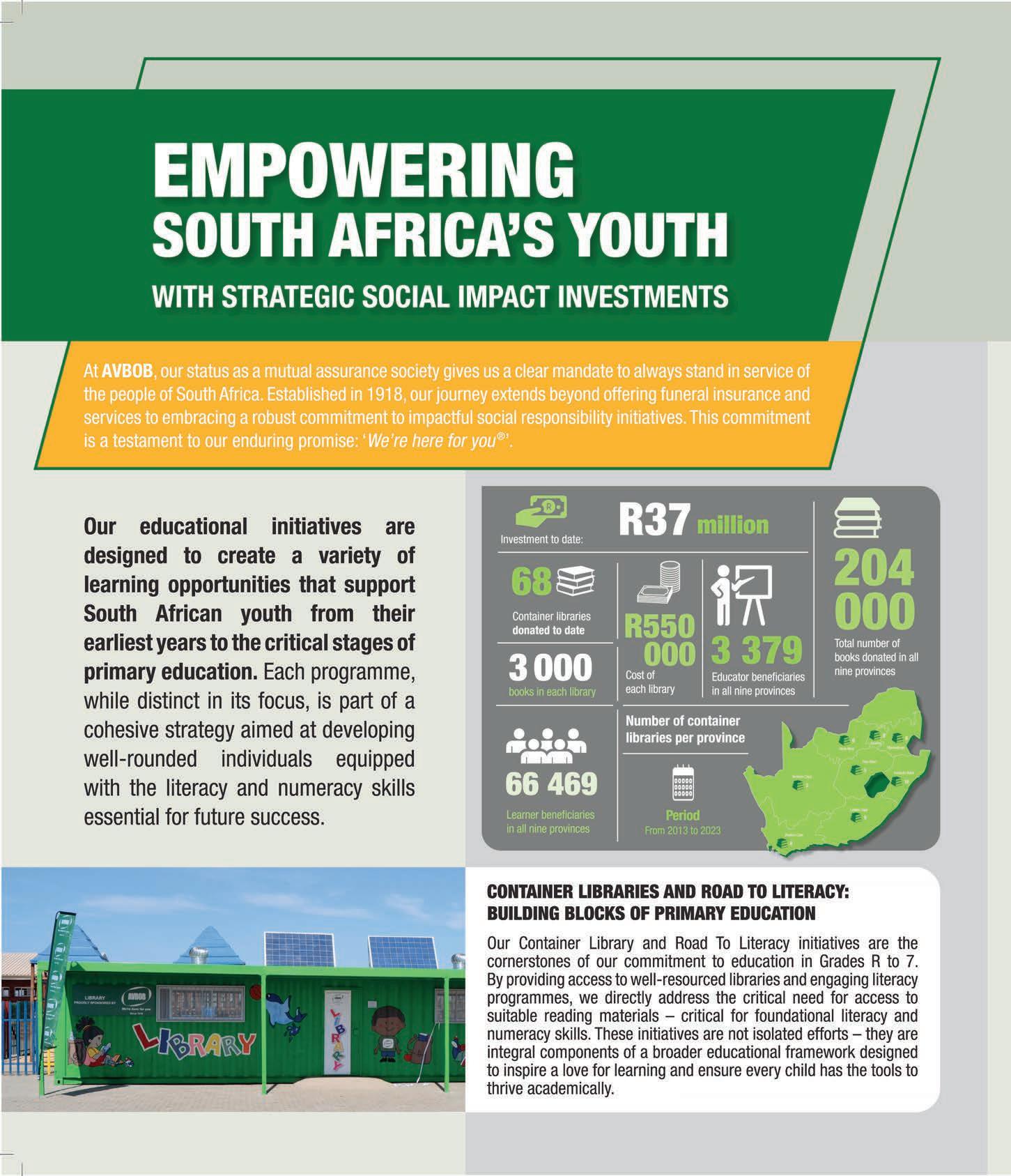
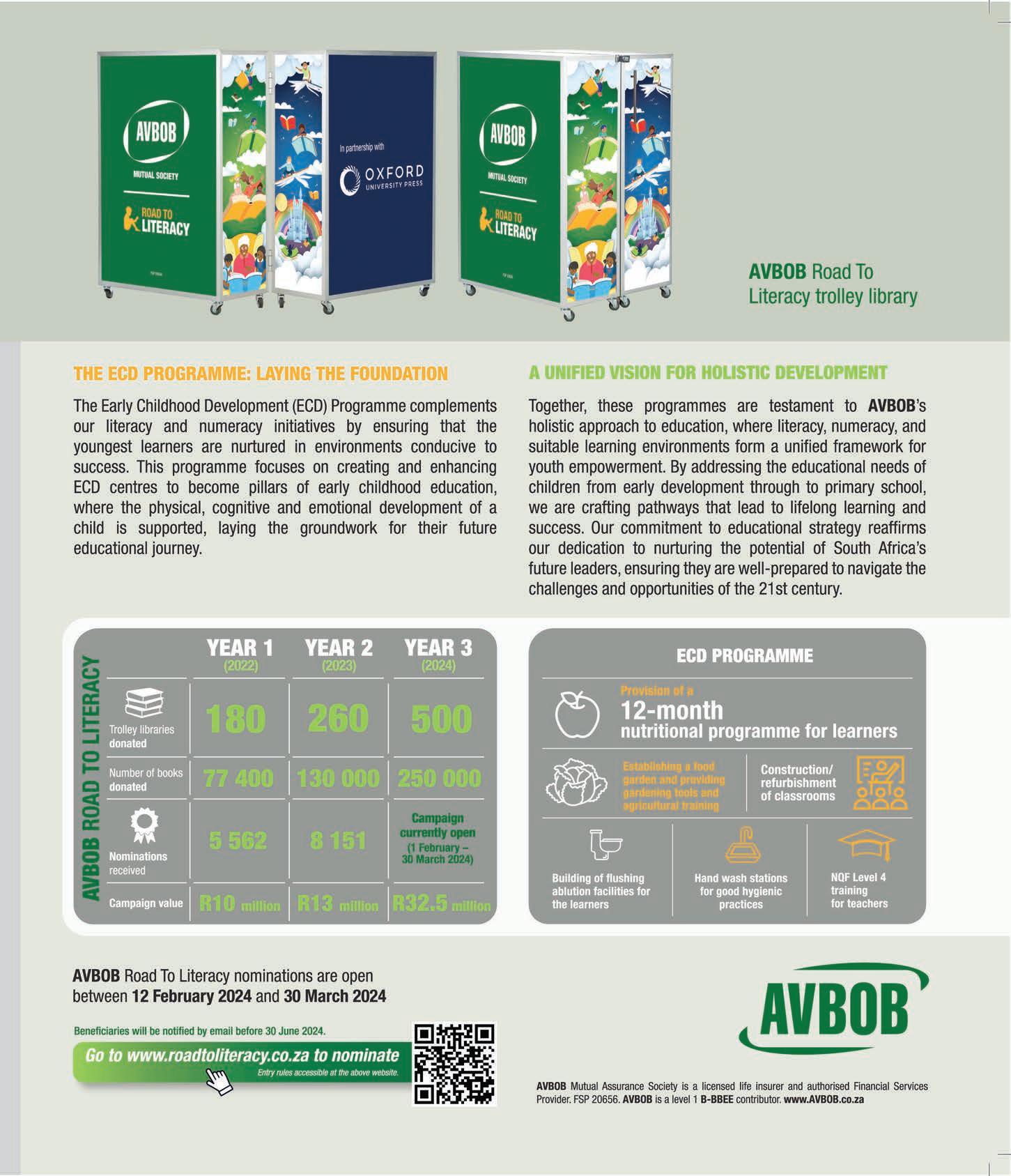

Limited resources are currently a major challenge to philanthropy, making strategic partnerships among the best tools to help organisations achieve maximum impact. By Relate Bracelets Brand consultant DALIT SHEKEL
Budget cuts are rife and, with more companies opting for non-cash donations in the corporate social investment (CSI) space in 2022, organisations are creating ways to keep internationally, the economic climate requires not only great collaboration but a more streamlined
with the Endangered Wildlife Trust (EWT) where we support each other in a cause that we are both passionate about: improving the wellbeing of animals.


The Chronicle of Philanthropy reports that the 50 wealthiest American
Charity Commission reports that
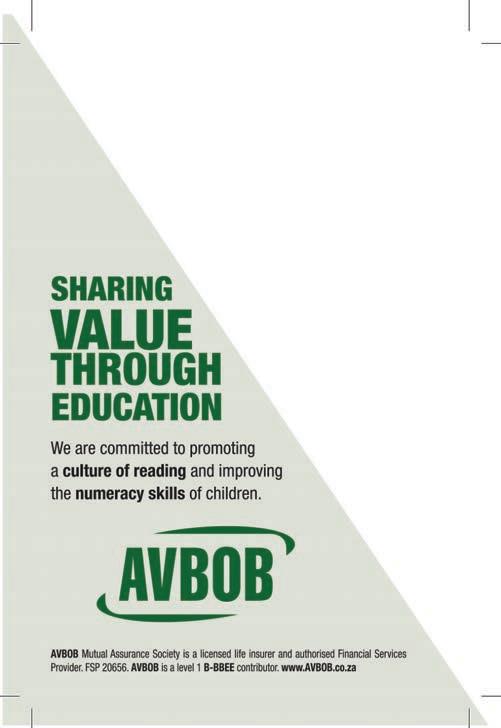
EWT is regarded as one of South Africa’s leading biodiversity conservation organisations facilitating the protection and sustainable use of key ecosystems. Relate Bracelets raises funds for charitable causes through the manufacture and sale of themed bracelets, and has managed to raise close to R3-million for EWT over the past decade. As a beneficiary, EWT channels these funds into projects that cater for the wellbeing of endangered animals. The value chain of this impactful work involves other stakeholders, such as SANParks and Tourvest, as retail outlets for these themed bracelets. Some of our more notable conservation feats include a cross-border relocation programme for wild dogs to prevent interbreeding and manage the breeding numbers. Similarly, the National Cheetah Metapopulation Project co-ordinates the conservation of 283 cheetahs in 48 small, fenced reserves. EWT is also behind the website for the Wild Dog Advisory Group of South Africa, an online resource on wild dog conservation and management. The direct relationship between Relate Bracelets and EWT
hasn’t been without challenges, yet it remains solid. Transparency, planning and trust are the key components to a successful partnership in the philanthropy space, and these two organisations share core values and the desire for greater impact in wildlife conservation. The only way we could get through trying times, such as the COVID-19 pandemic, was together as a team. Strategic thinking and co-operation got us over that period and enabled us to proceed with the projects to which we had already committed.

Endangered Wildlife Trust shop – your purchase supports various important conservation initiatives.

DEB ZELEZNIAK , CEO of the Santa Shoebox Project, on why donors and volunteers are needed to bring joy to disadvantaged kids

South Africans’ charitable behaviour has steadily declined over the past few years, according to the Southern African Philanthropy Foundation, with only 62 per cent of people saying they have helped a stranger – down from 72 per cent. They add that volunteering has also fallen to 28 per cent from 34 per cent, while those who make donations have dropped to 16 per cent from 28 per cent.
The cost-of-living crisis has played an understandable and limiting role, but when you realise the impact that donating and volunteering can have, not just on the beneficiaries, but also on the giver, you learn that giving is priceless.
I believe in and encourage South Africans to make a difference in the life of even just one child. At the Santa Shoebox Project, this is done by pledging a Santa Shoebox filled with essential items and treats for a kid in need to enjoy at Christmas time.
The gift of caring
Andrea Venter, a former children’s home resident and one of the very first Santa
Over the past 17 years, 1 152 587 children throughout South Africa and Namibia have been reached by the project.
Source: Santa Shoebox Project
Shoebox Project recipients, says that for many children, this is the only gift that they receive all year. “I will never forget when I was given my first Santa Shoebox. I was 17 and the excitement was overwhelming. To this day, I still have the hairbrush that came in the box and wish I had kept the note from the donor, as it was a letter of encouragement not to give up and it meant so much to me.”
Venter continues: “It felt like someone cared for me. This is why, when I became a donor some 10 years later and was putting together my shoebox, I put all the love that I could into that box. I just knew that it would go to a kid who would have the biggest smile on their face, just like I did all those years ago. And it
Traditional Santa Shoebox: Santa Shoeboxes each containing eight specified items of treats and essentials for children throughout South Africa and Namibia. From 1 September each year, Santa Shoebox donors choose their beneficiary child or children by name, age and gender, and are given the child’s clothing size.
Each personalised shoebox reaches the very child for whom it was pledged. Using the Santa Shoebox app, donors are able to track their shoebox from the moment it is pledged to the magical moment it is handed to the child.
Virtual Santa Shoebox: These shoeboxes are purchased online by donors and are available year-round, meeting the needs of donors who live too far from drop-off points, are too busy to shop or have health issues. A Virtual Santa Shoebox costs R450 plus an optional delivery fee of R30.
wasn’t because of the actual contents, but simply because somebody out there cared enough to send me a present, even though they had never met me.”
For Yona Gxasheka, who was brought up by her grandmother, her gift meant that she got to be a kid again. “Growing up, I was very conscious of our financial constraints. For instance, there would be days when I wouldn’t eat because I gave my food to my sister or wouldn’t go to school because I didn’t have books. I was so excited to receive that present – most of all about the outfit that I was given to wear on Christmas Day.”
Social media:
Website: santashoebox.org.za
TikTok: @santa.shoebox
Facebook: /SantaShoebox
X: @SantaShoebox
Instagram: /santashoebox
YouTube: The Santa Shoebox Project
Pinterest: /santashoebox
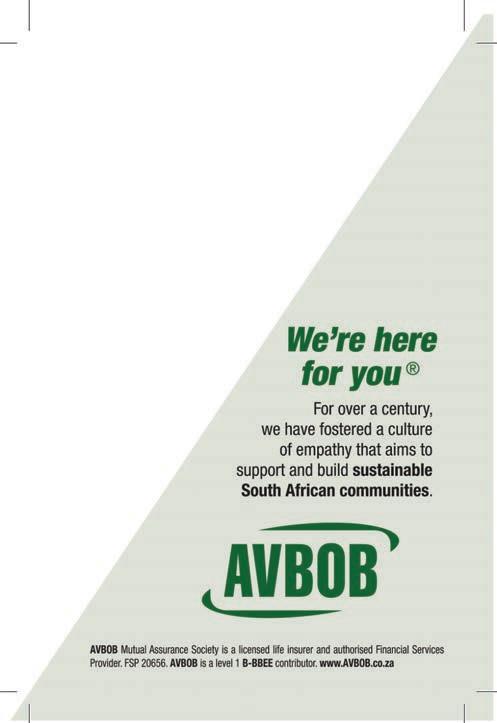
TAKALANI NETSHITENZHE , external affairs director at Vodacom South Africa, discusses the company’s initiatives and partnerships aimed at accelerating access to quality education
South Africa’s efforts in sustainable development are guided by the National Development Plan (NDP) 2030. In line with the United Nations’ 2030 agenda, the NDP prioritises the eradication of poverty, the reduction of inequalities and the growth of an inclusive economy. Quality education is essential to these goals.
Unfortunately, our education system continues to face challenges, including unequal access, inadequate infrastructure and under-resourced schools. To achieve the NDP’s vision and the UN’s Sustainable Development Goals (SDGs), we must address these issues to ensure quality education for all. On this transformative journey, partnerships are invaluable. By working together, the public and private sectors can pool their expertise, capabilities and influence to enable
change and create significant impact.


Vodacom supports the government’s objectives in accelerating access to quality education (SDG 4). To help bridge the inequalities in learning, we partnered with the Department of Basic Education (DBE), and nongovernmental and private sector organisations to launch a multifaceted education ecosystem in 2019.
A critical pillar of this ecosystem is early childhood development (ECD), which sets the foundation for lifelong learning. Through our partnership with the DBE, we have upgraded the ICT equipment, sanitation, water supply and education resources of 16 ECD centres countrywide, benefitting over 1 500 learners and educators. With other organisations, we initiated the Vodacom Green ECD Programme at eight of the centres. This programme aims to strengthen food security through sustainable farming (SDG 2) and improve the quality of life for the children and communities.
Public-private partnerships can foster an innovative learning environment, boost national capabilities and drive sustainable development. With the DBE, we have established 20 Schools of Excellence (SoEs) throughout South Africa to promote academic excellence for children mainly from disadvantaged communities. These schools are equipped with connected computer centres, upgraded infrastructure, security and ICT support and training. We have also placed 22 psychosocial support professionals in seven of the SoEs to address psychosocial issues, such as gender-based violence, which can affect learner wellbeing and performance.
Increased exposure to digital technology and digital education tools can equip young people
PUBLIC-PRIVATE PARTNERSHIPS CAN FOSTER AN INNOVATIVE LEARNING ENVIRONMENT, BOOST NATIONAL CAPABILITIES AND DRIVE SUSTAINABLE DEVELOPMENT.
with the skills required for the jobs of today and tomorrow. It can help reduce unemployment (SDG 8), a key component of the NDP. Our partnership with the DBE includes the launch of Virtual Classroom, an e-learning solution where learners can receive lessons via smart devices, making quality education more accessible.
Educators can play an important role in promoting digital education, but only if they have adequate training. With the DBE, Microsoft and other organisations, we have trained 525 830 teachers on how to integrate ICT into education. We have also established connectivity at 92 teacher centres countrywide, which also serve as ICT hubs for communities to access the internet and create opportunities for socioeconomic empowerment.
Transforming our education system is dependent on network infrastructure and access to connectivity, especially in rural areas. Public-private sector partnerships can help accelerate broadband coverage, improving the lives of many South Africans while bridging the digital divide. However, the benefits of connectivity can be threatened by damaged infrastructure, so all stakeholders, from network operators to law enforcement agencies and local communities, need to stand together to fight vandalism and theft. Failure to do so could hinder sustainable socioeconomic growth in this country.
Public-private partnerships are a powerful vehicle for enabling change in our education system, advancing the NDP and sustainable development. As South Africa charts its course towards a brighter future, government, businesses, civil society and citizens need to work together to build a more prosperous and equitable nation for all by 2030.


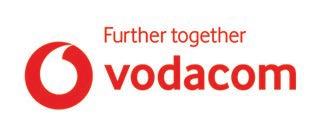
The South African private sector is stepping in to provide sustainable solutions to the country’s socioeconomic challenges.
By TREVOR CRIGHTONCorporate social investment (CSI) has moved from a “tick-box exercise” to a non-negotiable for any South African organisation to be able to consider itself a good corporate citizen. In tackling job creation, upskilling, reskilling, infrastructure development, the delivery of critical goods and services, and addressing equitable and sustainable social and environmental requirements, the private sector is helping to keep the country’s heart beating.
The MultiChoice Group invested R285-million in CSI in the 2023 financial year, with a focus on creating employment opportunities, developing emerging film-makers and nurturing future sports stars, reflecting the organisation’s dedication to social development.
“Our purpose is to enrich lives, not just through our services, but by using our powerful network to grow and develop our communities and the broader entertainment industry through community upliftment, talent discovery and development, and support for sporting codes and entrepreneurship,” says Dr Keabetswe Modimoeng, group executive: regulatory and corporate affairs at MultiChoice. “MultiChoice operates in developing countries with challenging economic conditions, income disparities and unpredictable political landscapes. These factors directly impact our communities, customers and business operations, presenting major sustainability challenges. As a global entertainment and services group, we are committed to addressing them proactively. Our approach entails meeting present needs while safeguarding the interests of future generations.”
Dr Modimoeng explains that their strategy focuses both on creating jobs and making a sustainable, generational difference in people’s lives. “If you look at our MultiChoice Talent Factory initiative, for instance, there’s a clear focus on taking graduates and equipping them with the necessary skills to thrive in the entertainment industry. The internship exposes them to the entire entertainment ecosystem
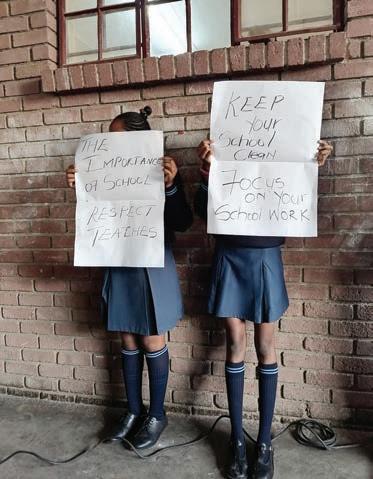
and potentially leads them being taken up for permanent employment.”
The most challenging aspect of executing a successful social impact strategy, explains Dr Modimoeng, is that as society continues to adapt to new ways of sharing experiences, and as the adoption of digital technology is fast-tracked, what remains is a need to stay connected to each other, to the values people hold dear, and to the things that bring them joy, inspire them and allow them to grow. “At MultiChoice, we embrace our role as a connector, connecting people to stories, storytellers to producers, opportunities to talent, jobseekers to jobs, fans to sport and entrepreneurs to customers. We do all of this because we remain committed to our purpose of enriching lives.”
The gold-youth development agency operates on a peer-led education system across Africa, where peer leaders and their mentors are embedded in schools and communities, developing young people from being passive recipients of negative norms to proactive agents
In 2023, 455 unemployed job seekers were recruited in the YES4Youth programmes second cohort, with 33 working with Motus’ flagship CSI partners. One-hundred and sixty-six YES learners from the second cohort (41 per cent) were hired in permanent positions at Motus.
Source: Motus
of positive change, empowering themselves and their peers to become the ethical and economically independent leaders of tomorrow. The organisation has trained and mentored more than 35 000 peer leaders, facilitated nearly 2 400 jobs, created more than 2 400 facilitator internships and reached over 92 000 peers in the last two decades.
Susannah Farr, gold-youth CEO, says that the peer-led system has proven effective because local and global research confirms that people don’t change with information alone, but rather when someone close to them changes. “This is especially true for young people who are influenced more by the opinions and examples of their peers than by those of their teachers and parents. Peer pressure, if structured positively through authentic relationships, knowledge sharing and mentorship, can be a powerful force for achieving human transformation. This means that the young leader whose life has changed for the better exercises immeasurable influence over their peers. Deep personal change leads to group change, which translates to wider community change.”
Farr says the organisation dreams of an Africa where young leaders from across the continent know the gold that is inside of them and live this out with purpose, changing the system of youth education and upbringing, ultimately enabling all young people to grow up in their communities to be healthy, spiritually alive adults who contribute towards social and economic flourishing. “Together with community-based organisations and strategic funders and partners, our mid-term goal is to mobilise 10 million young change-makers in Africa by 2032 as the catalysts for longer-term system change,” she concludes.


Toyota South Africa has a series of projects that address the country’s socioeconomic needs, ranging from conservation to carbon neutrality and cleaning up the country.
One project supported by Toyota is the Owl Rescue Centre, which strives to further initiatives towards protecting, rescuing and rehabilitating owls and other wildlife while making a meaningful impact on owl and wildlife conservation.
Toyota fully supports the Paris Agreement and has accepted the challenge to achieve carbon neutrality by 2050. It aims to reduce its vehicle CO2 emissions by 90 per cent by 2050, and is prioritising low-CO2 technologies and securing cleaner energy sources for its plants.
In September last year, the company collaborated with local nongovernmental organisation Clean Surf to spearhead a massive beach clean-up operation at the river mouth of the Umbogintwini River in Isipingo, where 150 dedicated volunteers removed more than 1 200kg of litter in a single day.
The Vodacom Foundation is the CSI arm of Vodacom South Africa, utilising its core capabilities in technological innovations and a portion of the company’s profi ts to empower society. The foundation has contributed to societal development since 1999, granting over R1-billion towards various programmes that have transformed ordinary people’s lives.
The foundation takes the lead in providing information and communication technology (ICT) support in CSI provisioning to communities, schools, government and organisations, and deploys its innovative mobile technology to enable social change, largely focusing on education and gender empowerment.
The foundation’s “ICT In Agriculture” programme addresses female empowerment in the knowledge-intensive fi eld, where new technologies emerge every day. Working in partnership with the United Nations Entity for Gender Equality and the Empowerment of Women and South African Women in Farming, the programme introduces women farmers to technology, enabling them to communicate with one another and access information about the farming value chain, fi nancial solutions and potential buyers.
Vodacom also continues to demonstrate the power of connectivity by establishing or supporting a host of mobile applications, including the VodaPay super-app, which combines its capabilities across consumers and merchants in payments, lending, insurance and e-commerce, and provides exposure to new growth verticals such as savings, investments and the VodaLend platform, which continues to extend credit to small to medium enterprises (SMEs). Kwika is a mid-priced point-of-sale device that enables SMEs to process debit and credit card payments and offer value-added services to consumers, among other features.




Motus’ CSI strategy supports initiatives that make a positive, long-lasting difference to the economies and communities in which it operates. The chosen pillars are education and skills development, road safety and primary healthcare, areas it believes deliver meaningful and positive impact that meets community needs. It has a long-standing commitment to road safety and supports Unjani Clinics NPC, which provides affordable, high-quality primary healthcare in areas where it is needed most.
The Imperial and Motus Community Trust builds and maintains school libraries and resource centres at under-resourced public schools to encourage reading and promote higher literacy levels. The YES4Youth programme is a key priority and continues to prove successful in creating working opportunities for unemployed youth. It plays a pivotal role in growing a multigenerational workforce in South Africa, serving as a pipeline for skilled professionals and future managers who will drive Motus forward.
YES4Youth helps fill high-attrition entry-level roles, has garnered good support from its business segments with active mentoring, and enables Motus to assess the capabilities and behaviours of learners, and their potential fit with the group. In 2023, Motus enrolled the second cohort of YES learners (455 unemployed job seekers) and in 2024 another 500 learners will join the group as part of its third cohort. Forty-one per cent of YES learners have been employed at Motus.
Motus provides apprentice training to around 1 200 apprentices.
Source: Motus

Toyota South Africa Motors (TSAM) shares how the Toyota GR Junior Academy is shaping the future of South African motorsport.
In the fast-paced world of motorsport, where the roar of engines and the thrill of competition dominate, Toyota Gazoo Racing South Africa’s (TGRSA) Junior Academy stands out not only as a breeding ground for future racing champions, but also a driving force for positive change in the South African motor racing community. Since its inception in 2022, this unique initiative by TGRSA has shaped the trajectory of young talent in motorsport as well as elevated the standard of motorsport in the country while becoming a powerful vehicle for corporate social investment, nurturing young talent and instilling values that extend far beyond the racetrack.
The TGRSA Junior Academy was born out of a vision to provide a platform for the development, mentorship and coaching of aspiring South African racing drivers. Under the guidance of seasoned professionals,
BEYOND THE THRILL OF THE RACE, THE ACADEMY BECOMES A CATALYST FOR PERSONAL GROWTH, INSTILLING VALUES OF DISCIPLINE, TEAMWORK, AND PERSEVERANCE IN ITS DRIVERS.
the academy has become a hub of talent, nurturing the dreams of young racers and cultivating them to become champions. The racing mentorship and training programme ensures we fulfil our objective to develop drivers across various motorsport formats, ultimately guiding them to participate and represent us at the Dakar Rally.
Central to the academy’s success is its holistic training programme designed to equip young drivers with more than just racing skills.

THE COMPREHENSIVE CURRICULUM ENCOMPASSES PHYSICAL FITNESS, MENTAL PREPARATION AND DRIVING SKILLS, LAYING THE FOUNDATION FOR SUCCESSFUL RACERS AND RESILIENT INDIVIDUALS.
The comprehensive curriculum encompasses physical fitness, mental preparation and driving skills, laying the foundation for successful racers and resilient individuals.
In an era where data analysis plays a pivotal role in performance improvement, the academy stays at the forefront by providing its drivers with the latest tools. Armed with cutting-edge technology, the young racers are empowered to dissect and enhance their performance on the track, preparing them for the challenges that lie ahead.
While speed and skill are paramount in motorsport, the TGRSA Junior Academy places an equally strong emphasis on safety and fair play. The academy is a training ground for racing prowess and responsible and safety-conscious racers.
All drivers are trained to follow strict safety protocols both on and off the track, emphasising the commitment to safety within the academy. This dedication not only promotes safer racing,
but also instils a sense of responsibility that extends beyond the boundaries of motorsport.
We believe the TGRSA Junior Academy has already positively impacted the local motorsport space by showing young racing talent that there is a future in motorsport and growth opportunities. Beyond the thrill of the race, the academy becomes a catalyst for personal growth, instilling values of discipline, teamwork and perseverance in its drivers.
The success stories of our alumni resonate loudly, echoing the impact of the TGRSA Junior Academy. Kian Grottis, the recently crowned 2023 regional champion in the premier DD2 class, exemplifies the academy’s commitment to producing champions. Grottis not only faced the challenges of championship contention, but also secured


a commendable fourth place in the 2023 national championship.
In the Senior MAX class, the journey of KC Ensor-Smith speaks volumes. Stepping up in class after being the 2022 national junior MAX champion, Ensor-Smith clinched a second consecutive national title, earning a coveted spot at the Rotax MAX Challenge Grand Finals (RMCGF) for the second successive season. Despite some strong pace this season, Olerato Sekudu was unlucky on several occasions, battling technical issues. He still managed a top-six finish in the national championship and backed up Ensor-Smith in a strong one-two finish in the regional competition. Ensor-Smith’s success, coupled with the performance of his teammate Sekudu, showcases the academy’s ability to mould top-tier talent.

The most recent addition to the academy, Junior MAX driver Kent Swartz, emerged triumphant in all competitions, claiming national, regional and African Open titles. Swartz’s success adds to the academy’s impressive track record and positions him as a representative of South Africa at the Rotax MAX Challenge Grand Finals.
In the Mini MAX class, Reagile ‘Spice’ Mailula’s victory in the opening round of the national championship marked a strong start to the season. Despite finishing fifth in the nationals, behind fellow academy driver Emma-Rose Dowling, Mailula’s consistent performance earned him the coveted 2023 African Open title, securing a spot alongside Ensor-Smith and Swartz at the RMCGF in 2023. Dowling, one of only a few female drivers competing in the sport, might have missed out on the podium, but a consistent season saw her achieve a top-four national finish.
TGRSA Junior Academy remains a testament to the hard work and dedication of everyone involved. Leeroy Poulter, owner of Xtreme Racing

and team manager of TGRSA Junior Academy, reflects on the academy’s success, stating: “The academy’s success is a testament to the hard work and dedication of the drivers, mechanic, and support staff.”
While the academy was well-represented across all classes over the past two seasons, the shifting landscape of motorsport means that a few new vacancies will be filled for the 2024 season that kicks off in March 2024. This presents an exciting opportunity for fresh talent to join the ranks and benefit from the academy’s holistic approach to development.
The academy’s impact extends far beyond the confines of the racetrack. By nurturing talent, promoting safety and fair play, embracing diversity and instilling values of discipline and perseverance, the academy is shaping not just racers, but also responsible and empowered individuals.
As the academy continues to positively impact South African motorsport, it stands as a beacon of hope and opportunity. The TGRSA Junior Academy’s journey is a testament to the transformative power of motorsport, creating a
THE TGRSA JUNIOR ACADEMY’S JOURNEY IS A TESTAMENT TO THE TRANSFORMATIVE POWER OF MOTORSPORT, CREATING A LEGACY THAT WILL RESONATE IN THE HEARTS AND MINDS OF FUTURE GENERATIONS FOR YEARS TO COME.
legacy that will resonate in the hearts and minds of future generations for years to come. Through racing, the academy is steering young talents towards success as well as driving the course of positive change in South Africa.



For
Educated and healthy individuals are more likely to participate in civic activities, support local businesses and contribute to the overall growth of their communities. As such, ROMPCO sees health as an essential component of sustainable community development
Trialogue’s latest research findings (2023) show that in contrast to United States trends, where health and social services receive 25 per cent of CSI spend on average, South African companies allocate an average of only 6 per cent to health. The proportion of local companies supporting the sector has also dropped, from 43 per cent in 2022 to 38 per cent this year.
While the decline is certainly worrying, there are corporations committed to investing for impact within the health sector. The Republic of Mozambique Pipeline Investments Company (ROMPCO) – a joint venture between the government of South Africa (represented by the South African Gas Development Company), the government of Mozambique (represented by Companhia Moçambicana de Gasoduto) and Sasol – pledged R1.5-million at the end of 2022 to restore infrastructure at the Tambo Memorial Hospital. At the beginning of March this year, they handed over the completed revamped project. The hospital serves the communities of Benoni, Boksburg and part of Germiston, catering to a population of over 1 million residents, offering essential services to both inpatients and outpatients.
The project aligns with ROMPCO’s broader strategy, which focuses on making a positive and sustainable impact on the communities in which it operates. It encompasses support for education and health initiatives, in addition to infrastructure development. “Our involvement in the project was extensive and committed,” says ROMPCO CEO Mlandzeni Boyce. “By supporting the restoration of Tambo Memorial Hospital, we demonstrate our commitment to social responsibility and community development. The project reflects our belief in contributing to the wellbeing and resilience of local communities, particularly in times of need.”
ROMPCO’s community development initiatives focus on education and health because the organisations believes that
these are essential to achieving sustainable development. Education is a key driver of economic growth and social progress, and health is a critical area of focus in community development initiatives. Access to basic healthcare services can help prevent illnesses, reduce mortality rates and improve overall wellbeing. When people are healthy, they can lead productive lives, contribute to their communities and drive economic growth. Investing in education and health not only benefits individuals, but also the wider community.

Overall CSI spend 2023:
• Over one-third of the corporate social investment healthcare expenditure (37 per cent) consisted of non-speci c general donations, an increase from 8 per cent in 2022.
• COVID-19-related interventions received the smallest share of healthcare spend in 2023 (4 per cent), a signi cant decrease from 32 per cent in 2022.
• The average healthcare spend allocated to wellbeing initiatives increased from 11 per cent in 2022 to 18 per cent in 2023.
Healthcare stakeholders say South Africa is not ready for the proposed National Health Insurance scheme, writes CHARMAIN NAIDOO
While delivering his 2024 State of the Nation Address, President Cyril Ramaphosa intimated that the National Health Insurance scheme (NHI) was imminent and that he was “looking for a pen” to sign the bill into law. This stirred rumblings among healthcare providers across the board and prompted many to ask if South Africa was prepared for or could afford this.
Finance Minister Enoch Godongwana’s budget speech revealed the extent of South Africa’s debt, underlining its inability to implement the expensive NHI system at this stage.
It is universally agreed that South Africa is poised for monumental changes in how healthcare is procured, funded and reimbursed. Prof Sharon Fonn, head of public health at the University of the Witwatersrand, said that while the idea of a NHI might be sound, there were concerns about its execution. “Firstly, there is no trust. Few people imagine that
a massive fund in the hands of government will be used well and will be exempt from pillage of one kind or another.”
Prof Fonn adds that historically there was a 10-year plan to get the public system working better, to allow us to move towards a single integrated system. “The point is that the ‘getting ready’ period did not get the health system ready. There is too much focus on the fund and not on the system itself. The fund relies on being able to do strategic purchasing. I doubt there is sufficient capacity on the supply or demand side for that.”
While there is a need for an NHI, there is a more urgent need to use resources to fix one facility at a time. Dr Brian Ruff, CEO of healthcare management company PPO Serve, describes an NHI system as “the deliberate separation of the contractual funding of the healthcare system from the supply of services in order to achieve efficiency for the patients”.

Climate change is a reality, so why are we ignoring it?
 By TREVOR CRIGHTON
By TREVOR CRIGHTON

The United Nations 2030 Agenda for Sustainable Development provides a shared blueprint for peace and prosperity for people and the planet, now and into the future. At its core are the 17 Sustainable Development Goals, which recognise that ending societal deprivation must go hand-in-hand with strategies that improve the lives of billions, while tackling climate change. The latter element is arguably the most pressing, as without a liveable environment, it is impossible to achieve the others.
Human rights and climate justice activist Kumi Naidoo says that the reality of climate change is immediate, not a problem for the future. “There’s a kind of cognitive dissonance and denial of the reality of how close to the climate cliff we are. All the extreme weather events in South Africa, Malawi, Mozambique, and large chunks of Europe and North America demonstrate beyond doubt what science has been telling us for years: that climate change is real.”

Kerri Savin, Nedbank senior manager: sustainability, says that transitioning out of fossil fuels quicker to limit the impacts of climate
change and using subsidies for farming to promote climate resilience are particularly important. “One of the partnerships we are particularly proud of is one with the WWF, which collaborates with farmers across different scales of production in various regions of South Africa, including the Western Cape, KwaZulu-Natal, Mpumalanga, Limpopo and the Eastern Cape, to help promote sustainable agriculture.
“Key initiatives include developing best practice guidelines and standards for sustainable farming, facilitating agroecology training for smallholder farmers linked to Participatory Guarantee Systems standards and extension services, catalysing innovation, empowering farmers and promoting shared learning and market access.”
Naidoo believes that South Africa’s political and business leaders are “sleepwalking us into a crisis of epic proportions. We cannot change the science, but we can replace our leaders,” he says. Naidoo believes the answer to supporting people in rural areas – where most of our food is farmed – is to establish decentralised solar micro-grids that will remove the reliance on
Eskom power to perform tasks from pumping borehole water to processing crops.
Savin says that Nedbank has played a key role in the agricultural sector, in particular, by introducing sustainable agriculture funding solutions to address the challenges farmers face due to climate change, including reduced rainfall and increased temperatures, which make it difficult for farmers to produce food sustainably. “The sustainable agriculture solutions provide farmers with funding to improve their farming practices, such as water conservation and storage, improved soil health, advanced irrigation techniques, and shade-netting to minimise evaporation. In South Africa, sustainable agriculture is essential for addressing the intertwined challenges of social upliftment, food security and climate change.”
Naidoo says that there’s a disconnect between what government says in international forums and the policy changes enacted – or not – back home. “At COP28, we were largely on the side of the majority in expressing the same level of urgency to make dramatic changes, yet nothing that government has put on the table has engaged the country’s citizens and made climate change a real priority.”
“All the extreme weather events in South Africa, Malawi, Mozambique, and large chunks of Europe and North America demonstrate beyond doubt what science has been telling us for years: that climate change is real.”
– Kumi Naidoo


Adcock Ingram and Food & Trees for Africa have joined forces to make a positive impact on pastoral activities, habitat destruction, deforestation and overgrazing challenges in the Eastern Cape. By Food & Trees for Africa head of programmes ROBYN HILLS
Renowned for its rich biodiversity and natural beauty, the Eastern Cape is home to hundreds of bird and tree species. However, the region faces significant challenges due to pastoral activities, habitat destruction, deforestation and overgrazing, resulting in the loss of many valuable species.
In response to this ecological crisis, Adcock Ingram and Food & Trees for Africa (FTFA) embarked on “Greening the Path”, a collaborative initiative comprising a week-long series of educational workshops and tree-planting activities aimed at revitalising the natural environment in communities around Mthatha.
This project, spearheaded by the dedicated FTFA team in the Eastern Cape, has been made possible through a donation by Adcock Ingram
that has had a profound impact, reaching 837 direct beneficiaries across 31 sites throughout the Eastern Cape. These sites include:
• Ngxanga School
• Mangqukwana School
• Elukhanyiswani Junior Secondary School
• Pumelelo Community
• The Movement in Africa nonprofit organisation
• 24 homes
• Two co-operatives FTFA has planted more than 4.7 million trees over the last 31 years. We currently plant just over 30 000 trees every year. The Eastern Cape deserves hundreds of community-based orchards and forest zones.
In addition to the extensive work done in Mthatha, the Greening the Path initiative has also extended its reach to other communities.
Set up in 2010 as one element of the Broad-based Black Economic Empowerment transaction conducted by South African Breweries Ltd, the SAB Foundation is an independent trust that annually invests millions of rands in entrepreneurs and social innovation
The SAB Foundation focuses on businesses creating opportunities for women and youth, people in rural areas and persons with disabilities. Some of the programmes it supports include:
The Social Innovation and Disability Empowerment awards: The Social Innovation Awards are for innovators, social entrepreneurs, institutions and social enterprises with prototypes or early-stage businesses aimed at solving social issues. The Disability Empowerment Awards are for innovators, social entrepreneurs, institutions and social enterprises whose innovations focus on providing solutions for persons with disabilities.
Tholoana Enterprise Programme: An 18-month programme designed to empower entrepreneurs across all sectors, helping them establish sustainable businesses. It offers
comprehensive support to entrepreneurs, equipping them with the skills and resources they need, as well as providing catalytic funding, extensive training in entrepreneurial skills, mentorship and opportunities to access markets, finance and practical business tools.
Rural Catalyst Programme: This explores innovative methods of generating employment opportunities in rural areas through entrepreneurship. Its objective is to identify profitable business frameworks that can be scaled up or duplicated in different localities.
Financing For Impact Programme: In partnership with Lead Impact Capital and the National Treasury’s Jobs Fund, this was developed with an investment of R88-million. Its aim is to unlock affordable financing for qualifying alumni entrepreneurs who are looking to scale their businesses and create more jobs.

A further 500 trees were provided to schools and gardens in Thembisa, Johannesburg, for example. This collaborative effort between Adcock Ingram and FTFA not only reaffirms our dedication to environmental sustainability, but also reflects our shared vision of preserving and restoring the natural beauty of the Eastern Cape. By working together, we are contributing to the reforestation of our precious ecosystems while providing valuable education and resources to empower local communities.

IMPACT OF THE SAB FOUNDATION
As at March 2023:
• Over R563-million has been invested in entrepreneurship and social innovation.
• 6 442 entities have been supported.
• 90 per cent of businesses supported are still operational.
• 10 384 new jobs have created.
• 63 676 livelihoods have been positively impacted.
Source: SAB Foundation
For more information:
Visit sabfoundation.co.za or email sabfoundation@za.ab-inbev.com
Facebook: sabfoundationsa | X: @sabfoundationsa
LinkedIn: sab-foundation | Instagram: sabfoundationsa
YouTube: @sabfoundation5695
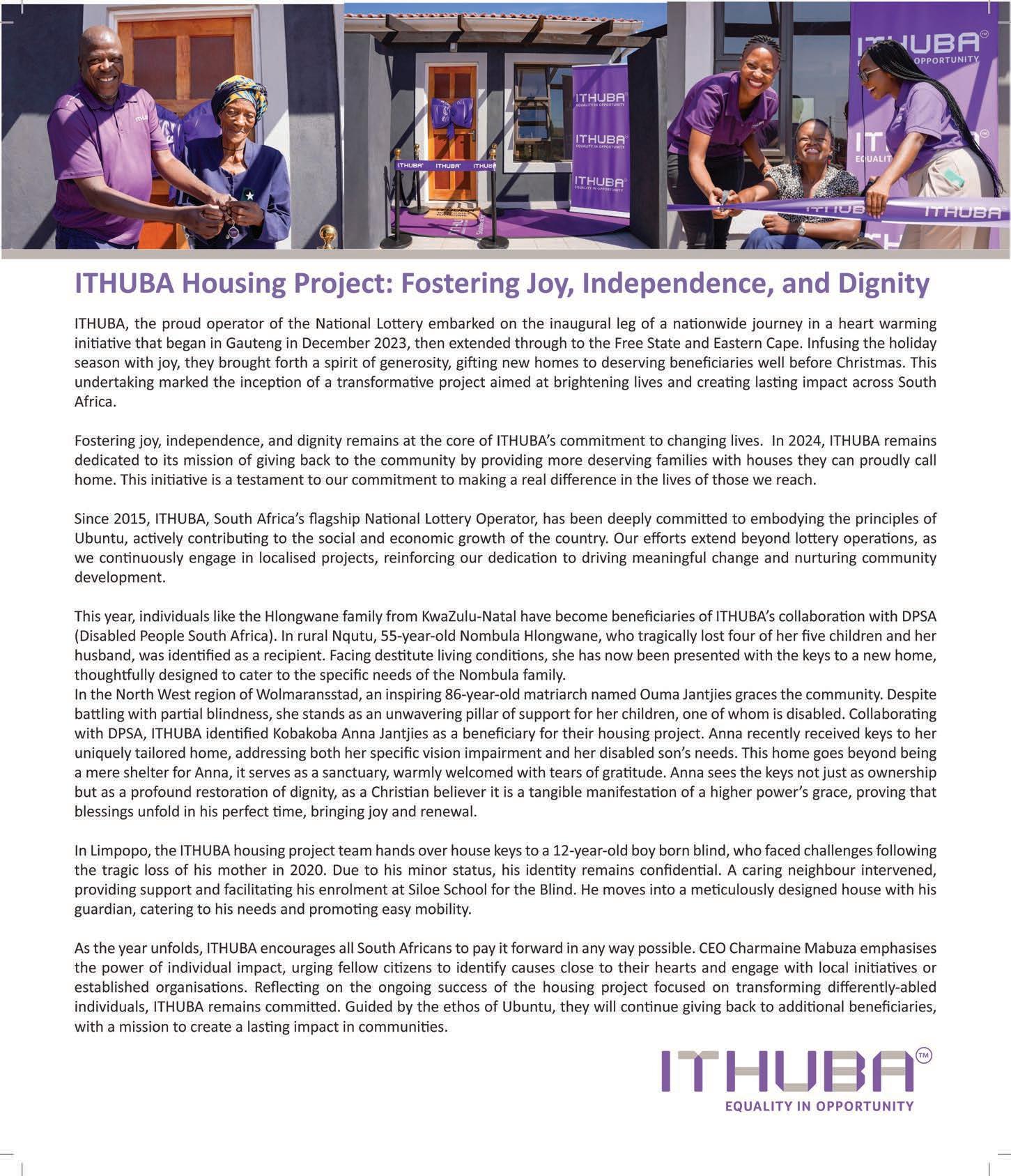
A look at the transformative measures ROMPCO has initiated in South Africa and Mozambique

In a world where socioeconomic disparities continue to persist, initiatives aimed at uplifting communities and fostering sustainable development play a pivotal role in driving positive change. Among the trailblazers in this noble endeavour is the Republic of Mozambique Pipeline Investments Company (ROMPCO), a beacon of hope and progress in South Africa and Mozambique. Through a multifaceted approach that combines strategic interventions, community engagement and a steadfast commitment to empowerment, ROMPCO has emerged as a catalyst for transformation, touching the lives
THROUGH
of countless individuals and leaving a lasting mark on the landscape of social responsibility.
In South Africa, where ROMPCO has established a strong presence, our commitment to uplifting communities is exemplified through the following initiatives.
This transformative programme aims to address the challenges faced by young girls in accessing sanitary towels, a barrier that often results in school absenteeism and low self-esteem. By providing essential resources to 10 secondary schools in the Badplaas Circuit,
A MULTIFACETED APPROACH THAT COMBINES STRATEGIC INTERVENTIONS, COMMUNIT Y ENGAGEMENT AND A STEADFAST COMMITMENT TO EMPOWERMENT, ROMPCO HAS EMERGED AS A CATALYST FOR TRANSFORMATION.
ROMPCO has touched the lives of over 7 000 learners, restoring dignity and opening doors to a brighter future. Ten secondary schools in eManzana (Badplaas) Circuit benefitted from this programme. Initially planned for girls, the programme extended its reach to benefit boys as well, ultimately impacting a total of 7 127 learners positively.
The programme comprises two components: the Mobile Science Laboratory and Vacation Camps. It is tailored for 10 secondary schools in the Badplaas Circuit, encompassing Tjakastaad and Elukwatini. This initiative offers additional tuition support for Grade 8–12 gateway subjects, including mathematics, physical sciences, accounting and life sciences. Implemented in close collaboration with the eManzana Education Circuit of Gert Sibande District, Mpumalanga, the programme aims to enhance academic achievement and opportunities for students in the region. The programme has served over 1 400 learners, ensuring access to quality education and fostering academic excellence.
The Vacation Camp programme offers a five-day residential camp per term, focusing on extra tuition in mathematics, physical science and life sciences for Grade 12 students. Held at secluded campgrounds, such as Queens River Resort, the camp is facilitated by qualified educators during the March/April and September/October school holidays. Each session accommodates over 200 learners, ensuring personalised attention and engagement. With innovative teaching methods, students gain a deeper understanding of subjects and develop essential skills for future academic success.
ROMPCO proudly sponsors the Sasol Grade 12 merit awards, an annual event recognising and rewarding outstanding academic achievement. The objectives include encouraging enrolment

in STEM (science, technology, engineering and mathematics) subjects, fostering academic excellence across all disciplines and strengthening partnerships with the Mpumalanga Department of Education.
In collaboration with the Department of Education, ROMPCO supports the Ehlanzeni District Awards, where the top 22 achievers in mathematics and physical science receive R10 000 each towards their tertiary education. Additionally, seven top-performing priority subject educators are honoured with R2 500 gift vouchers.
In collaboration with Ride4Hope and the Nelson Mandela Foundation, ROMPCO identified Isifisosethu Primary School in Standerton, Mpumalanga, as a legacy project. With 1 600 learners from Grade RR to Grade 7, the school faced overcrowding and a critical need for space. To address this challenge, ROMPCO erected and sponsored three classrooms and a storage and office space.
These new facilities accommodate an additional 120 learners annually, alleviating the strain on the school’s infrastructure. Additionally, ROMPCO provided furniture for the classrooms and office. This marked another milestone in ROMPCO’s commitment to improving educational facilities and opportunities in South Africa.
In response to the tragic gas explosion that occurred near the OR Tambo Memorial Hospital on Christmas Eve 2022, ROMPCO, recognising the immediate need for support in restoring the hospital’s infrastructure, engaged with hospital management to identify priority areas where its assistance could make a meaningful impact.
Through extensive discussions and collaboration, the need for installation of comprehensive hospital signage emerged as a critical component of the restoration efforts. ROMPCO pledged R1.5-million towards aiding the hospital’s recovery and improving the patient experience when navigating through the hospital.
In addition to our impactful initiatives in South Africa, ROMPCO extends its commitment to community development and empowerment across borders. Recognising the importance of addressing socioeconomic disparities in Mozambique, ROMPCO embarked on a transformative project – the Community Development Centre (CDC) in the district of Chokwé, Macarretane Administrative Division, Village of Manjangue.
Through rigorous needs assessments and strategic planning, ROMPCO identified the CDC as the optimal solution to uplift communities along the Mozambique to Secunda Pipeline gas pipeline route. Located in the heart of Chokwé, the CDC aims to bolster human development and sustainable empowerment, fostering
ROMPCO IS DRIVING POSITIVE CHANGE AND MAKING A MEANINGFUL DIFFERENCE IN THE LIVES OF COUNTLESS INDIVIDUALS ACROSS MOZAMBIQUE AND SOUTH AFRICA.
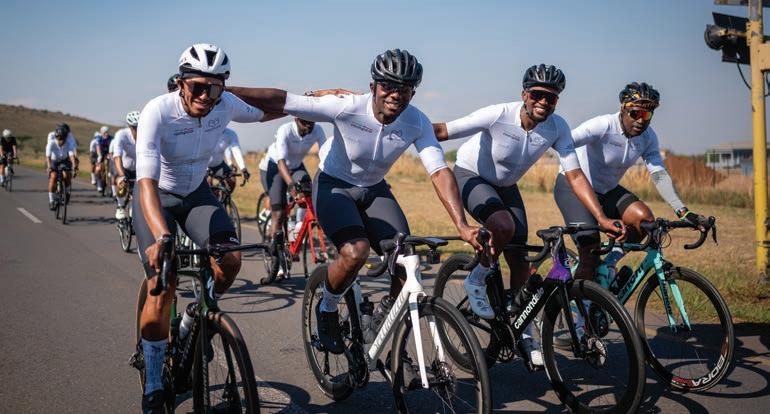
inclusive growth and prosperity in collaboration with communities across the Inhambane, Gaza and Maputo provinces. The CDC will focus on agriculture to enhance food security, skill development, environmental sustainability and job creation.
ROMPCO has committed to refurbishing a secondary school in the Chigubo District that suffered severe damage from harsh weather. Construction has commenced at the Armando Emílio Guebuza Secondary School in Ndindiza. The school upgrade includes the building of three classrooms, a library, an admin block, a multipurpose playground and a fence wall. ROMPCO recently held a brick-laying ceremony with local authorities in Chigubo to mark the official start of construction. The project is due for completion by June 2024.
These initiatives exemplify ROMPCO’s unwavering commitment to social impact and community development. By empowering individuals and communities, fostering education, nurturing future leaders and supporting health initiatives, ROMPCO is driving positive change and making a meaningful difference in the lives of countless individuals across Mozambique and South Africa. As we continue this journey, we remain steadfast in our dedication to driving growth, prosperity and improved health outcomes for all.


Scan

For more information:
+27 11 523 3600
info@rompco.co.za
www.rompco.co.za
In what has historically identified as a profit-driven environment, more and more South African companies are redefining their roles in society, embracing impactful initiatives that resonate deeply with the communities in which they operate.
A recent Trialogue report revealed a significant rise in corporate social investment (CSI) spending, totalling R11.8-billion in the 2023 financial year – an 8 per cent nominal and 1 per cent real increase from the previous year, indicative of a post-COVID-19 recovery amid challenging economic conditions.
“South African companies, primarily driven by a moral imperative to influence positive social change, are increasingly positioning themselves to achieve systemic impact,” says Trialogue director Cathy Duff. “Their CSI efforts are becoming more collaborative, and resources are being applied to research, networking and thought leadership in their development fields of interest. This is securing their voice on critical social issues and contributing to addressing the country’s social development challenges in the face of government budget cuts.”
Putting the numbers into perspective
ITHUBA, Oceana and Sibanye-Stillwater are practical examples of shared value initiatives.
Since 2018, ITHUBA, the national lottery operator, has been transforming lives through its housing programme, providing South Africans with homes they can finally call their own. What started as an initiative for ITHUBA employees has developed into a partnership with Disabled People South Africa to identify beneficiaries in urgent need of specially designed homes.
“Our housing initiative, driven by the core value of ubuntu, reflects our belief in the strength of community,” says Kamogelo Aphane, corporate affairs specialist at ITHUBA. “After realising the pressing need for homes among disadvantaged individuals in South Africa, we took action.
“The decision to focus specifi cally on families living with disabilities in our housing project was motivated by our commitment to inclusivity and addressing unique needs within our communities.”

Seafood company Oceana is another business making social change.
“Over the few years we’ve established and built strategic partnerships with nongovernmental and nonprofit organisations to amplify our efforts to address issues affecting our communities,” says Zodwa Velleman, Oceana Group executive for corporate and regulatory affairs. “Our purpose is to make a positive impact on society by creating long-term sustainable value for all our stakeholders.”
Oceana’s impactful partnerships include its longstanding collaboration with the Peninsula School Feeding Association and its backing of the innovative Gift of the Givers food security programme. Through Lucky Star, Oceana supports a school feeding scheme in conjunction with the Peninsula School Feeding Association, ensuring all 502 learners at HP Williams Primary School in St Helena Bay receive nutritious meals while aiming to eliminate the stigma associated with accepting school meals.
Additionally, Oceana joined forces with Gift of the Givers, Cape Nature and Invasive Fish Species Management during the fi rst COVID-19 lockdown in April 2020, addressing ecological imbalances caused by invasive carp and providing fresh fi sh to local communities. Oceana’s introduction of a mobile freezer solution facilitated the project’s expansion
to communities as far as Oudtshoorn, Uniondale, George and Plettenberg Bay, benefi ting over 170 000 people.
Velleman concludes that all these innovative approaches align with Oceana’s commitment to food security and its strategy of collaborating with local experts to address critical challenges effectively.
For mining company Sibanye-Stillwater, the impact lies in “community ownership and collaboration to ensure lasting impact, fostering socioeconomic progress in mining towns and beyond,” says Thabisile Phumo, executive vice president of stakeholder relations at Sibanye-Stillwater.
According to its most recent published financial reports, the company has invested R362-million in socioeconomic development, paid over R177-million in dividends to community trusts and spent over R20-billion in black economic empowerment procurement (75 per cent of total procurement) at South African operations in 2022.
One programme that is an example of collaboration is the Bokamoso Ba Rona Agri-Industrial Initiative, an agri-industrial project near its mining operations in the West Rand District Municipality. This collaborative effort aims to boost post-mining economic sustainability by creating jobs and entrepreneurial opportunities, particularly in agriculture and industry.
The company has earmarked 30 000 hectares of land, in partnership with the Far West Rand Dolomitic Water Association, to economic programmes that will catalyse a post-mining economy and create jobs in the district. This collaborative effort aims to boost post-mining economic sustainability by creating jobs and entrepreneurial opportunities, particularly in agriculture and industry.
“Historically, CSI was just about giving,” says Phumo. “However, in our view it is meant to contribute to capacity building, recognising social asset mapping and development models that can catalyse the empowerment of communities beyond our contribution.”



“The impact lies in community ownership and collaboration to ensure lasting impact, fostering socioeconomic progress in mining towns and beyond.” – Thabisile Phumo




























There has never been such a thing as business as usual. What was usual yesterday is likely less relevant today, and what is the norm today is always evolving.
But what we can say is that that current practices are being transformed by the mega-trend of sustainable development and, as with previous mega-trends of industrialisation, urbanisation and digitalisation, all forms of organisations have to adapt.
There is an important normative argument that we should all be acting more responsibly and sustainably. However, we aren’t talking about doing good or giving back. The imperative to operate differently cannot be separated from the clear business case.
This isn’t just about maintaining a license to operate. It goes much deeper than that. Our current situation means that it isn’t just organisations that have to adapt or die; our whole species and way of life are on the line.
The pressures to be a responsible business go beyond traditional tick-box exercises and additional social responsibility programmes. We see increasingly that consumers and employees are likely to consider the impacts of a business (and they are much more visible to the world than ever) before committing to them, along with investment and funding being more aligned to nonfinancial indicators of success, and mandated requirements intensifying.
Seeing the bigger picture, legislative changes at national and supranational levels (for example
We need to recognise that current decision making is not fit for purpose. A primary focus on financial performance has led us to where we face a fork in the road.
the European Union’s nonfinancial disclosure requirements) can be seen as a response to societal pressures. However, these should also be viewed as governments recognising the costs of addressing climate and societal challenges and essentially passing on the bill to business.
So, what do we need to do differently?
We need to recognise that current decision making is not fit for purpose. A primary focus on financial performance has led us to where we face a fork in the road.
We can take the road to where a focus on maximising shareholder value has been incredibly successful – for some. However, this route has created a system where we face multiple climate crises as we sail past planetary boundaries, while entrenched inequalities persist and create risks to the fabric of societies.
Or we can take the alternative course, one where financial value is still important – but only a part of how we make decisions. The alternative system is a transformational journey that views what is material from a broader and more complete lens. This changes decision making to where we take account of the effects on multiple stakeholders. This means we need to measure the social (including environmental) impacts of our activities –not just our positive intended impacts, but those that are unintended that will likely include negatives.
Doing so, we are better able to consider the trade-offs between costs and benefits for people and planet. This will generate insights about our choice of actions and allow us to make optimal decisions.
We make decisions all the time, and they will never be risk-free. This is what impact measurement and management is all about. At its core, it is about having evidence to make better decisions, ones that have a greater chance of being the optimal choices, and where the risks of being wrong are reduced. To do this we need to understand the impacts of our work and how those people affected value them. When we have a better understanding of what matters most to our stakeholders, we can focus our resources on them. This means we can achieve what we all want, creating sustainable long-term value for our organisations, stakeholders and society.
In a country where access to quality healthcare remains a pressing issue, AfroCentric, a leading black-owned investment holding company, has taken bold strides towards transforming lives through its corporate social investment (CSI) initiatives. With a laser focus on healthcare, youth and education, AfroCentric’s strategic approach to social investments has not only addressed historical inequalities, but also catalysed sustainable change in communities across South Africa.
At AfroCentric, our commitment to social responsibility is ingrained in our DNA. By leveraging our expertise in the healthcare sector, we have designed CSI initiatives that align with our business objectives while addressing the most critical socioeconomic challenges facing our nation. Through strategic partnerships and targeted investments, we are paving the way for a healthier, more prosperous future for all.
One of our flagship initiatives, the AfroCentric Bursary Programme, stands as a testament to our dedication to nurturing talent and fostering diversity in the healthcare workforce. By specifically targeting previously disadvantaged black female students, we are not only breaking down barriers to education, but also ensuring broader representation and cultural competency within the healthcare sector.
Our holistic approach, which includes mentorship and wellness support, sets the stage for academic and professional excellence, ultimately enhancing healthcare services in communities nationwide.
In 2023, we proudly celebrated the graduation of our inaugural bursary recipients, with two students achieving cum laude . These gifted individuals are currently doing their internships with prestigious institutions, such as the University of Pretoria Tambo Memorial Hospital in paediatrics, University of Pretoria Tambo Memorial Hospital in internal medicine, University of Pretoria Pietersburg/Mankweng Hospital in obstetrics and gynaecology, and Sefako Makgatho Health Sciences Letaba Hospital in internal medicine.
Their dedication to academic excellence underscores our commitment to nurturing the next generation of healthcare professionals. Their achievements highlight the transformative influence of education and the lasting effect of targeted social investments.
Discover how AfroCentric’s corporate social initiatives are shaping South Africa’s future and transforming healthcare.
By AFROCENTRIC
AfroCentric Group Chairman Dr Anna Mokgokong and Non Executive Director Board Member Dr Nkateko Munisi (bottom far right) with AfroCentric Group and Sanlam Executives and bursary students.
Subsequently, our company’s bursary programme has expanded to encompass more deserving students in the fields of medicine, pharmacy and nursing.
At AfroCentric, we recognise that lasting change requires collaboration and collective action. This is why we have forged impactful partnerships with organisations, such as the South African Business Coalition on Health and AIDS (SABCOHA). Since 2019 and through our joint efforts, we implement health screening programmes and drive sustainable
health outcomes for communities nationwide. Our recent initiative, which extended wellness screenings to 25 000 community members in Musina Limpopo included HIV counselling and testing, STI screening and screening for noncommunicable diseases. AfroCentric allocated additional funding to the BizAIDS Programme for small business owners to examine their business, health and legal risks and learn how to take action to reduce those risks.
Preceding the Limpopo event, AfroCentric collaborated with SABCOHA in 2019/2020 for the Adolescent Girls and Young Women (AGYW) programme, initiated by the Global Fund and SABCOHA. This initiative targeted young girls
THE AFROCENTRIC BURSARY PROGRAMME STANDS AS A TESTAMENT TO OUR DEDICATION TO NURTURING TALENT AND FOSTERING DIVERSIT Y IN THE HEALTHCARE WORKFORCE.
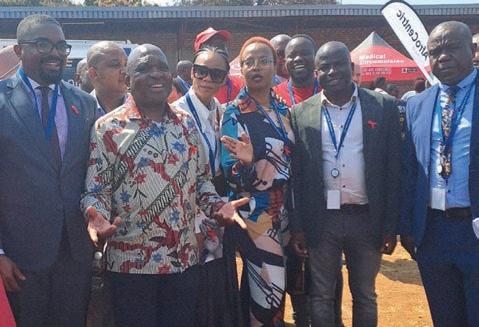
and women in various provinces, including KwaZulu-Natal, Eastern Cape and Mpumalanga, among others. With AfroCentric’s contribution, SABCOHA provided comprehensive health screenings to over 16 000 community and workforce members alongside sponsoring test kits, training and monitoring services.
Continuing our support in 2020/2021, AfroCentric contributed to the Male Sexual Partners programme. This extension enabled additional health target screenings for over 16 000 community members across various areas, including Cape Town, Tshwane and Burgersfort. The initiative prioritised reaching men and supporting their small businesses and establishing partnerships for maximum outreach.
Despite challenges, such as funding delays and the pandemic, the initiative’s sustainability was evident. Effective data reporting systems ensured project success, enhancing uptake in HIV, TB and chronic disease screenings and interventions among male sexual partners.
In our unwavering commitment to improving access to healthcare services and uplifting communities, AfroCentric Group has, since 2017, proudly partnered with Vision 4 Change. Through our collaboration, we have embarked on a transformative journey to address one of the most significant impediments to the education and development of children from disadvantaged communities: vision impairment. Vision is Vital, an intervention project spearheaded by Vision 4 Change, aims to change the lives of underprivileged children by providing them with free visual screening. All learners identified with eyesight challenges are fitted with free prescribed spectacles according to each child’s specific needs, enabling access to essential vision care. Recognising that proper vision is essential for sporting and academic
success and wellbeing, AfroCentric is proud to support this initiative, which seeks to ensure that every child has the opportunity to thrive.
The Department of Basic Education has identified vision among schoolchildren within public schools as one of its major educational challenges, making Vision is Vital’s drive even more essential. To date, we have enabled hundreds of children countrywide to benefit from this initiative.
In November 2022, AfroCentric partnered with Vision 4 Change to deploy a dedicated team of optometrists to screen and test learners from two underprivileged schools in Dunoon, Cape Town. Despite the community’s enduring challenges, such as socioeconomic hardships and past incidents of violence, our commitment to making a difference remained unwavering.
During the screening, 2 437 learners underwent testing and 219 children with visual impairments requiring further attention were identified. Thanks to our collaboration with Vision 4 Change, these children received tailored prescription spectacles, not only enhancing their vision, but also their ability to engage fully in academic and extracurricular activities.
In November 2023, funded by AfroCentric, Vision 4 Change continued to impact young South Africans in identified communities, extending support to Thandokuhle Primary and Khethamahle Primary in Kwa Mashu, Durban.
In both schools, 547 children were screened
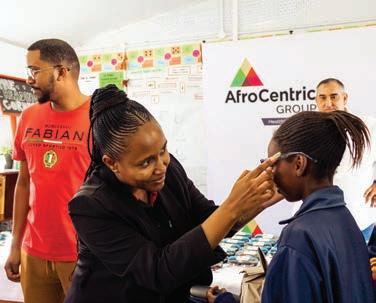
and tested, with free prescription spectacles provided to learners with visual impairments through the expertise of qualified optometrists. The project’s success added invaluable support to the schools, recognising the crucial role visual perception plays in effective learning, academic achievement and sporting prowess.
Since 2017, Vision 4 Change, in collaboration with AfroCentric, has traversed South Africa, impacting the lives of learners in previously disadvantaged schools, demonstrating a sustained commitment to fostering positive change.
As we reflect on our journey, our resolve to drive positive change and transform lives through strategic social investments remains solid. By investing in education, empowering under-represented communities and fostering sustainable partnerships, AfroCentric is not only shaping the future of healthcare, but also building a healthier, more equitable society for generations to come.
Our mission to transform healthcare, enhance the quality of life of our fellow countrymen and build a brighter future for all is ongoing. Together, we can make a difference. AfroCentric – empowering communities to live with healthy confidence.



For more information:
PalesaM@afrocentrichealth.com
www.afrocentric.za.com
As environmental, social and governance goes mainstream, the public, regulators, investors and funders are starting to notice,
writes BUSANI MOYOThere is a growing awareness that the environmental, social and governance (ESG) framework is now the model for stakeholders who want to understand how their organisations manage opportunities and risks associated with ESG elements.
As ESG goes mainstream and becomes a central part of the strategy of many investors, efforts to consolidate international standards, frameworks and innovations in the financial instruments used to raise ESG and impact capital for development outcomes have also ramped up. This reality indicates that capital markets also realise their power in supporting desirable change.
The Organisation for Economic Co-operation and Development (OECD) recently released a report on ESG investing. It says: “While earlier approaches used exclusionary screening and value judgments to shape their investment decisions, ESG investing has been spurred by shifts in demand from across the finance ecosystem, driven by both the search for better long-term financial value and pursuit of better alignment with values.”
Dawid de Villiers is a partner at South African law firm Webber Wentzel and is keenly interested in ESG. He was asked for insights into the ongoing efforts to consolidate international standards, frameworks and innovations in the financial instruments used to raise ESG and impact capital for developmental outcomes. He noted that regulatory efforts have escalated in the last few years.
De Villiers gives an example: “In March last year, the Financial Sector Conduct Authority
(FSCA) released its Statement on Sustainable Finance, outlining substantial measures to mitigate emerging conduct risks linked to sustainable finance. The FSCA is gearing up to implement more stringent oversight and heightened transparency in the realm of financial institutions’ investments and products.”
De Villiers refers to Regulation 28 of the Pension Funds Act, which he says has been infl uential. He says the act requires “pension funds to consider factors affecting the sustainable long-term performance of assets, including ESG aspects. Recent amendments to legislation governing the Public Investment Corporation include promoting sustainable development.”
On the international front, the OECD report agrees with de Villiers, stating: “The growth in the use of ESG disclosure, ratings and various types of ESG-related funds has invited greater scrutiny from a range of market practitioners, and there is a growing awareness from within the industry that ESG investing practices need to evolve to meet the expectations of its users and to sustain trust.”
Naava Mashiah is a Switzerland-based asset manager helping ultra-high net worth families channel capital towards impact investing opportunities and access ESG-compliant investment products. She suggests that “by expanding the range of financial instruments such as sustainability-linked bonds (SLBs) and green, social, sustainability and sustainabilitylinked bonds, we may have a better chance
“By expanding the range of financial instruments such as sustainability-linked bonds (SLBs) and green, social, sustainability and sustainability-linked bonds, we may have a better chance to close the Sustainable Development Goals financing gap.”
– Naava Mashiah


to close the Sustainable Development Goals financing gap. Results-based financing sustainability-linked bonds are a newer addition to the sustainable debt asset class.”
According to Mashiah, outcome-based or performance-based financing, such as SLBs, “reflects a shift in focus from inputs to outcomes”. She adds that this change in mindset is no longer the preserve of philanthropy and public procurement, but is now also evident in the private sector. Compared to traditional financing instruments, Mashiah says that SLBs go further by “encouraging issuers to develop holistic sustainability strategies and increasing transparency”.
While the progress on consolidating international standards and frameworks and innovations in the financial instruments used to raise ESG and impact capital for development outcomes is evident, it can also be noted that this is still a work in progress. “In terms of disclosures, it is not mandatory to disclose ESG matters yet,” concludes de Villiers.


ISO 14001 environmental accreditation. Such a sustainability journey starts with minimising the construction impact associated with operations, which can be achieved through responsible planning and execution to prevent environmental encroachment and reduce the ecological footprint of any infrastructure development.

Environmental, social and governance principles are becoming more important for businesses, and for good reason, writes
ROBERT ERASMUS, MD of Sanitech
Embracing environmental, social and governance (ESG) practices is not just a trend; it is a strategic move towards long-term success. Given the potential environmental impact in the sanitation and waste management industry, the adoption of ESG principles is more of a responsibility than a choice. However, it’s not one without benefit. By understanding the significance of aligning with these principles, businesses can create lasting value for stakeholders while contributing meaningfully to local and global sustainability goals.
The growing importance of ESG in business ESG principles provide a comprehensive framework for evaluating a company’s operational performance in relation to its social and environmental impact.
Traditionally, investors focused on financial metrics, but evolving business practices and growing investor consciences demand a broader perspective. Investors and stakeholders are now scrutinising a company’s commitment to environmental sustainability and social responsibility, and its willingness to demonstrate strong governance. This makes the shift towards ESG compliance a necessity for attracting investment in today’s eco-conscious, interconnected world.
Understanding ESG can seem daunting at first, but at its core it is a set of practices that evaluate a company’s performance through the lens of its social and environmental impact. While the implementation of these principles might seem overwhelming, it’s much easier to gain momentum by taking an incremental approach.
One of the most productive methods for organisations to elevate their ESG status is by means of ISO 14001 environmental accreditation, which provides a structured path to address issues such as energy consumption and waste management. ISO 14001 is an internationally recognised standard that sets out the requirements for an environmental management system, which helps organisations gradually improve their performance through more efficient use of resources and reduction of waste.
Within the sanitation and waste management sector, for example, ESG compliance centres on environmental stewardship, extending beyond straightforward waste reduction to include responsible choices aligned with environmental preservation. Companies in the sector should commit to aligning processes with global standards through
One of the most productive methods for organisations to elevate their ESG status is by means of ISO 14001 environmental accreditation, which provides a structured path to address issues such as energy consumption and waste management.
Additionally, companies within the sector should actively support renewable energy initiatives, along with displaying a dedication to promoting environmentally friendlier alternatives, such as the use of biowaste for energy generation. Companies must place a strong emphasis on water conservation and responsible wastewater management to contribute to the reduction of water consumption, with adherence to stringent environmental standards.
Furthermore, the reduction of greenhouse gas emissions poses a notable challenge for most industries, particularly those with intricate logistical operations
The social component of ESG is where companies in the sanitation and waste management sectors have the opportunity to shine, as investing in water and sanitation projects is one of the most powerful ways for businesses to fulfil their social responsibility goals within the ESG framework. Water and sanitation projects have the most profound impact on communities and, by leveraging their expertise, businesses can partner with sanitation and environmental management companies to create positive social change, particularly in areas that desperately need improved water and sanitation infrastructure.
Governance forms a critical aspect of compliance, and organisations that want to take ESG seriously should join forces with like-minded companies that have a shared commitment to ethical practices. This will not only facilitate smoother collaboration but also ensure a unified approach to tracking, measuring and reporting on ESG initiatives, which will make the journey less complex and more attainable. Practical steps, such as focusing on specific areas like waste reduction, or water and sanitation, can significantly contribute to a company’s overall ESG compliance without incurring exorbitant costs.
By demonstrating their own dedication to increasingly sustainable business practices, companies in the sanitation and waste management sector can play a significant role in fostering environmental responsibility while delivering value to stakeholders.
At first glance, the trend of private sector investment in developing countries seems contradictory. In the realm of education, private schools and for-profit institutions often cater to higher income brackets, perpetuating a cycle of educational privilege. Conversely, private healthcare providers in Africa are increasingly targeting low-income communities and underserved areas, aiming to bridge the gap in access to basic medical services. This seemingly illogical pattern raises questions about the true potential of impact investing in fostering both economic and social development in a nation like South Africa.
Understanding the motivations behind these trends sheds light on the complexities of private investment in developing economies. Private education providers typically target high-income families for a simple reason: profitability. Wealthier families are more likely to be able to afford the high fees associated with private schools, which often boast enhanced facilities, Senior environmental, social and governance specialist CUMA DUBE writes that the paradox of private investment in Africa highlights the need to move beyond a purely profit-driven approach

smaller class sizes and specialised curricula. This focus on profit creates a system favouring the already privileged, potentially exacerbating existing educational inequalities.
However, the healthcare sector paints a different picture. Africa faces a significant shortage of doctors and healthcare facilities, particularly in rural areas, creating a lucrative market for private healthcare providers willing to operate in these underserved communities. Unlike education, where the demand comes from those who can afford it, in healthcare, the demand is already established – it’s the

Africa faces a significant shortage of doctors and healthcare facilities, particularly in rural areas, creating a lucrative market for private healthcare providers willing to operate in these underserved communities.
supply that’s lacking. Private providers see an opportunity to fill this gap, offering basic medical services at a lower cost point than traditional, often overstretched public facilities. This focus on accessibility allows them to serve a large, previously neglected population segment, while still achieving financial viability.
This raises an important question: Does the seemingly positive trend in private healthcare investment truly represent a commitment to social impact? The answer lies in the business model adopted. Some providers offer basic services at minimal fees, relying on high patient volume for profi tability. This can have a positive impact on access, but the quality of care may be compromised due to limited resources and staffi ng.
Others adopt a tiered pricing structure, offering a wider range of services at different price points, catering to both low- and middle-income populations. While this expands access for a broader segment, concerns might arise regarding long-term sustainability and the potential for neglecting the most vulnerable patients who cannot afford even basic services.


For impact investing to reach its full potential in South Africa and other developing economies, a more nuanced approach is required.
1. Promoting social impact bonds: These innovative financial instruments allow investors to provide capital to social enterprises focused on education and healthcare for low-income communities. The government repays the investors with interest if predetermined social outcomes are achieved.
2. Prioritising public-private partnerships: Collaboration between the public and private sectors can leverage the strengths of both.
Governments can provide land, infrastructure and regulatory support, while private companies bring their expertise, efficiency and innovation.
3. Fostering a supportive regulatory framework: Governments should establish clear regulations that incentivise private investment in education and healthcare, while ensuring quality of services.
4. Measuring and reporting impact: Impact investing thrives on transparency and accountability. Investors need a clear framework to measure the social impact of their investments, not just financial returns.
Nations need to be nurtured in order to achieve sustainable growth, writes senior environmental, social and governance specialist CUMA DUBE
The path to economic prosperity and development for developing countries is rarely a straight line. Limited resources, underdeveloped infrastructure and social inequalities all pose significant challenges. In this complex landscape, traditional investment strategies often fall short. This is where developmental investing emerges as a powerful tool, fostering not just financial returns, but also tangible progress towards a nation’s economic and human development goals.
Since emerging from the crucible of post-World War II reconstruction efforts, developmental investing has evolved into a potent force driving economic and human development worldwide. As newly independent nations grappled with poverty and underdevelopment, a new approach was needed. Traditional models focused on maximising short-term profits often neglected the long-term needs of the developing world. Developmental investing, on the other hand, recognised the interconnectedness of economic growth and social progress. Pioneering institutions like the Government Employees Pension Fund (GEPF) aim to channel some of their investments toward sectors and themes critical to a nation’s development.
Led by purpose
“Being a purpose-led investor requires deep introspection and commitment on a fundamental and first principles level –
understanding why you are investing and the sole reason for your existence to ensure the sustainability of our pension promise for the long term,” says Belaina Negash, environmental, social and governance (ESG) manager at the GEPF. “This includes being acutely aware of emerging social norms and expectations, government policies, mega-trends and other exogenous factors as they remain dynamic and impact our systemic investment ecosystem.
“Our Developmental Investment Policy aims to support and guide investment toward creating a sustainable, equitable and inclusive economy. This policy outlines the GEPF’s priorities and objectives for directing investments in its unlisted portfolio, which may include investments in infrastructure development, job creation, poverty reduction and environmental protection, while earning risk-adjusted returns for its members, pensioners and beneficiaries.”
The core principle of developmental investing lies in aligning financial returns with positive social and environmental impacts. This goes beyond mere philanthropy.
However, implementing a successful developmental investing strategy requires a multipronged approach. Governments play a crucial role in creating an enabling environment that attracts investors. This includes establishing a stable political climate, ensuring a transparent and predictable regulatory framework and combating corruption. Additionally, it is essential to create a clear
The contrasting trends in private investment for education and healthcare in Africa highlight the need to move beyond a purely profit-driven approach. By fostering innovative financing models, encouraging collaboration and creating a supportive regulatory environment, South Africa can harness the power of private capital to achieve true impact across education, healthcare and other critical sectors.
The seeming paradox of private investment in education and healthcare reveals a deeper truth: impact investing requires a strategic approach that goes beyond simply directing private capital towards developing economies.
national development plan that outlines key priorities and identifies sectors most in need of investment.
Another critical factor is fostering public-private partnerships (PPPs). By leveraging the expertise and resources of the private sector, governments can accelerate the pace of development. PPPs can be particularly beneficial in infrastructure development projects, where the upfront costs can be significant.
The GEPF’s developmental investment strategy is deeply rooted in its investment beliefs and commits the fund to investing in economic infrastructure, social infrastructure, environmental sustainability and enterprise development in transformative ways – a strategy Belaina says is consistent with South Africa’s National Development Plan, and its international obligations and best practice in this area.
This approach is not without its critics. Some argue that the focus on social impact may lead to lower financial returns for investors. However, the long-term benefits of a stable and prosperous nation often outweigh these concerns. Additionally, the growing focus on ESG factors by investors worldwide creates a fertile ground for developmental investing strategies that demonstrably address these concerns.
In conclusion, developmental investing offers a compelling alternative to traditional investment strategies for developing countries. By aligning financial returns with social and environmental progress, it provides a roadmap for sustainable economic growth and human development.
While challenges exist, by creating an enabling environment, fostering partnerships and promoting domestic investment, developing countries can unlock their full potential and take their place on the global stage as thriving economies with empowered citizens.
Our education system is one of the main drivers of growing innovation in South Africa. It is imperative that we equip the system with the tools and spaces to enable and empower this innovation, writes STANDARD
At Standard Bank, we know we have a role to play in driving South Africa’s growth, and we also know that our people are our biggest asset. The skills and education system should be front and centre of any socio-development programme, whether in the public or the private sector. One of the best ways to drive this support is through public-private partnerships. Our partnership with the National Education Collaboration Trust (NECT) is exactly the type of impactful programme where we see these results. The NECT was founded in 2013, as a distinguished National Education Improvement Initiative by government, business, and teacher unions. The organisation was established to provide support to the government in fulfilling the ambitious education goals outlined in Chapter 9 of the National Development Plan (NDP).
Since 2014, Standard Bank decided to support and work closely with the NECT to drive innovation and development in education through collaboration, harnessing the power of multiple stakeholders and driving evidence-based educational system enhancements. In the 10 years of their existence, the NECT, apart from working with the Department of Basic Education, they have worked with over 120 organisations and more than 115 000 teachers to achieve these goals. The achievements below prove that this power of partnership is paying off.
The strength of partnership is clear when one considers that Standard Bank contributed R69.3-million for core funding (which represents 14 per cent of the total funding received from the private sector) for the NECT. And, for every Rand invested by SBSA, R162-million was unlocked from the government for core funding. The following shows where the impact of this funding is felt, with the whole system benefitting.
Over the years, the NECT has successfully trained over 115 000 teachers, reaching
91 per cent (22 812) of the schooling system across all nine provinces. On-the-job professional development for teachers is paramount for enhancing education.
Over 30 million teacher and learner materials have been supplied for mathematics, science, and languages, facilitating enhanced learning experiences. Ablution facilities have been provided to over 650 schools, ensuring improved sanitation and hygiene standards for learners and staff.
Courageous and effective leadership
A total of 16 511 school managers have been empowered through the NECT’s curriculum and learning management training across four provinces. Effective school management is crucial for facilitating and mediating any reform and improvement initiatives in education.
The NECT has hosted over 145 dialogues and engagements on critical education improvement issues. These platforms have played a vital role in leveraging social capital and driving significant policy changes.
Over 5 687 community and school-based beneficiaries have been empowered to provide psychosocial support to learners and teachers. Additionally, 4 873 youth countrywide have been reached through the Ubuntu Youth Leadership Programme, which fosters servant leadership among the youth.
Many of the NECT’S strengths came to the fore during COVID-19 when they were able to provide:
• Evidence-gathering for decision-making: conducted four phases of independent school-readiness assessments on whether provinces were ready to reopen schools safely.
• Ensuring learning continuity: through remote and digital learning initiatives and teacher curriculum support, the NECT reached over six million learners, teachers and parents to limit the impact of school closures on teaching and learning.
• Teacher and learner wellbeing: reached almost 65 000 teachers, learners and community members through psychosocial support programmes.
• Dialogues and strategic communication: hosted over 15 civil society forums with the Department of Basic Education, unions and other education partners – critical for sharing information and ideas on limiting the impact of COVID-19 on education.
• Mobilisation of social capital and resources to support remote teaching and learning during the pandemic.
The power of partners working towards a common goal, leveraging fi nancial and knowledge resources, and building and empowering people is exactly how Standard Bank believes we will drive South Africa’s growth.


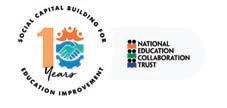
Impact management and the role of intermediaries are evolving, writes senior environmental, social and governance specialist CUMA DUBE

Corporate social investment (CSI) has long been a cornerstone of corporate responsibility, reflecting a commitment to social and environmental causes beyond profit-driven motives. However, as the landscape of corporate engagement evolves, so too do the strategies for allocating CSI budgets. Companies are increasingly repurposing these budgets to align with broader societal needs, leveraging the expertise of intermediaries to navigate complex social issues. This shift prompts reflection on whether or not these changes are indeed fostering greater impact.
Traditionally, CSI budgets were often dispersed across a spectrum of charitable initiatives, ranging from community development projects to environmental conservation efforts. While these initiatives undoubtedly contributed positively to society, the evolving socioeconomic climate demands a more strategic approach.
Companies are now recalibrating their CSI budgets to address systemic challenges, such as poverty alleviation, education reform and sustainable development. This shift reflects a recognition of the interconnectedness of social issues and the need for comprehensive, long-term solutions.
In this transition, intermediaries play a pivotal role in facilitating meaningful engagement between companies and social causes. These intermediaries, which include nongovernmental organisations, philanthropic organisations and social enterprises, serve as bridges between corporate entities and grassroots initiatives.
Intermediaries bring specialised knowledge, networks and resources to the table, enabling companies to navigate complex social issues effectively. They help to identify high-impact projects, facilitate partnerships and provide crucial insights into local contexts.
For example, organisations like the Global Impact Investing Network connect investors with opportunities for sustainable impact, while platforms like B Lab certify businesses committed to social and environmental performance.
Several companies have publicly reported instances of repurposing CSI budgets to achieve greater impact. Unilever, for instance, has shifted its focus from traditional philanthropy to sustainable business practices embedded within its core operations. Through initiatives like the Unilever Sustainable Living Plan, the company aims to improve the lives of billions while reducing its environmental footprint.
Nedbank has pioneered innovative approaches to CSI through its Affinity Programme, which allows customers to link their banking products to various causes, such as conservation, education and healthcare. A percentage of transaction fees is then allocated to support these initiatives, empowering customers to contribute to social causes effortlessly.
The true impact of repurposed CSI budgets extends beyond immediate outcomes, encompassing systemic changes, capacity building and empowerment of marginalised communities.
Shoprite has prioritised addressing food insecurity through its CSI initiatives. The company invests in sustainable agriculture, food distribution networks and nutrition education programmes to alleviate hunger and promote food sovereignty. By partnering with local farmers and community organisations, Shoprite empowers vulnerable populations to access nutritious food and build resilience against food shortages.
Similarly, Salesforce has allocated a portion of its CSI budget to support education and workforce development programmes. Through partnerships with organisations like Year Up and Genesys Works, Salesforce provides underprivileged youth with access to training and employment opportunities in the tech sector.
The ultimate measure of success lies in the tangible impact generated by repurposed CSI budgets. While anecdotal evidence suggests positive outcomes, rigorous impact assessment remains a challenge.
Measuring social impact is inherently complex, often requiring a combination of qualitative and quantitative metrics. Companies must track outcomes, assess long-term sustainability and solicit feedback from stakeholders to gauge effectiveness accurately.
Moreover, the true impact of repurposed CSI budgets extends beyond immediate outcomes, encompassing systemic changes, capacity building and empowerment of marginalised communities. Companies must adopt a holistic approach to impact assessment that captures these multifaceted dimensions.
The repurposing of CSI budgets signals a paradigm shift in corporate engagement with societal issues. By leveraging the expertise of intermediaries and embracing strategic alignment, companies are poised to achieve greater impact and foster sustainable change.
However, realising the full potential of repurposed CSI budgets requires ongoing evaluation, adaptation and collaboration. It demands a commitment to transparency, accountability and inclusivity in decision-making processes.
As companies navigate this evolving landscape, they must remain vigilant in their pursuit of social impact, continuously reassessing their strategies and recalibrating their priorities. Ultimately, the journey towards meaningful corporate citizenship is one of shared responsibility, collective action and enduring impact.

We recognize that each child in South Africa is entitled to a good quality education to help them escape the bonds of poverty and despair.
DP World and Motus Community Trust, previously known as Imperial and Motus Community Trust
• • • •

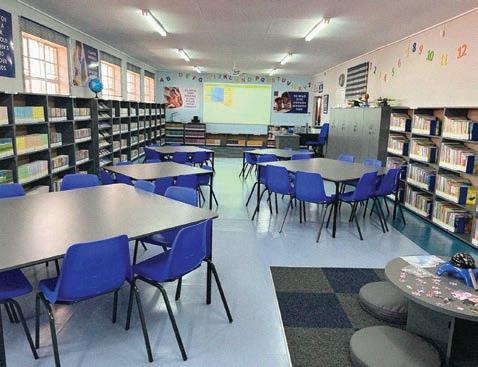
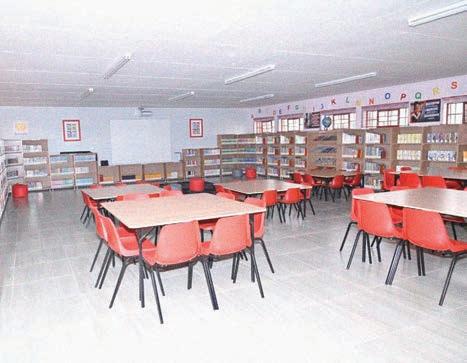

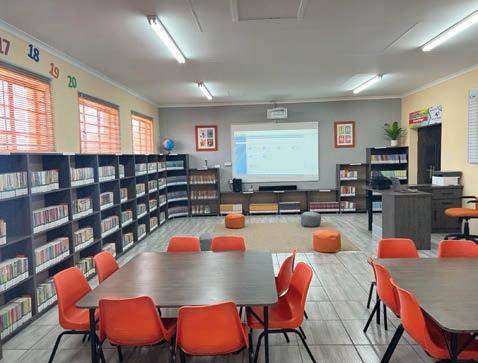



Impacts 87340 learners daily who visit the library to participate in:
9000 learners participating in online reading and language programme, that can be accessed at home so learners continue to practice reading skills after schools, over weekends and school holidays. CONTACT

